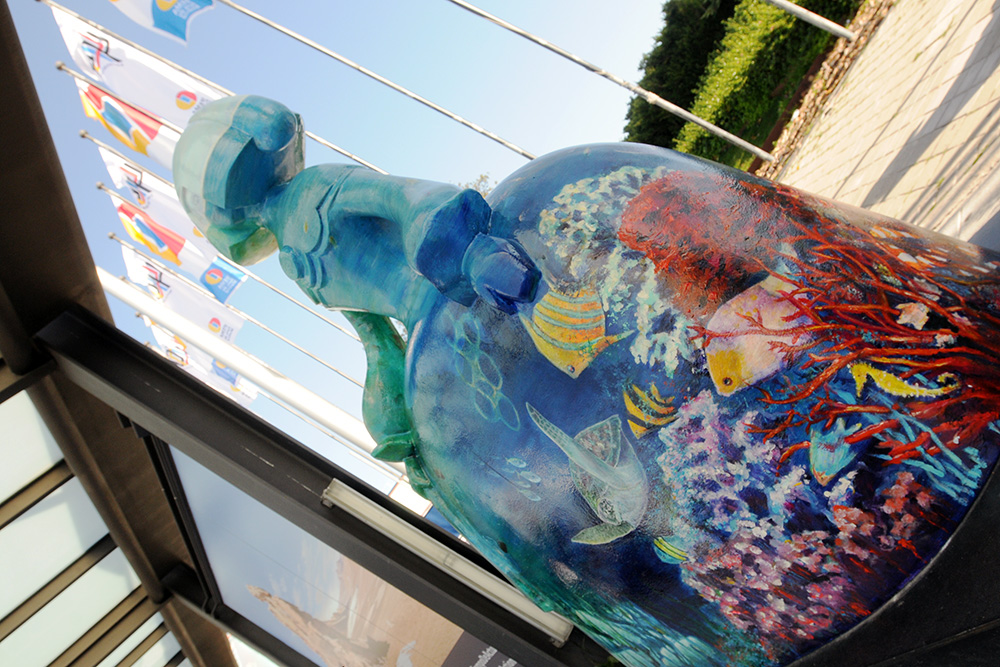
Oceans Action Day at the 25th session of the Conference of the Parties to the UN Framework Convention on Climate Change (UNFCCC COP25) in Madrid, Spain, was the eighth in a series of ocean thematic days held since COP 15 in Copenhagen, Denmark, in 2015. Oceans Days have focused on promoting the oceans agenda at COPs and on developing cooperation and coherence in policies and programmes at multiple levels in order to implement a comprehensive strategy on oceans and climate, both within and outside the UNFCCC process. COP 25 has been dubbed the “Blue COP” in an effort to bring oceans more firmly into the climate negotiations. This year’s Oceans Action Day assessed existing ocean and climate action and identified the gaps that need to be addressed. The events also considered the need to ensure that discussions on the ocean-climate nexus take into account the magnitude and importance of this interface.This year’s Oceans Action Day featured five High-Level Panels and was hosted by the Governments of Japan, Chile, and the UK:
- The Oceans and Climate Nexus within the UNFCCC and Beyond;
- Incorporating Ocean-Related Options in Nationally Determined Contributions (NDCs);
- Ocean Science to Action for Adaptation and Displacement Solutions;
- Galvanizing Support for Oceans and Climate Action; and
- Oceans Action Day at COP 25 Reception
Oceans Action Day at COP 25 was held on 7 December and was organized by: the Global Ocean Forum; the Intergovernmental Oceanographic Commission (IOC) of UNESCO; the Food and Agriculture Organization of the UN (FAO); the Ocean Policy Research Institute of the Sasakawa Peace Foundation, Japan; Oceano Azul Foundation, Portugal; Plymouth Marine Laboratory, UK; International Union for Conservation of Nature; Because the Ocean Initiative; the Ocean and Climate Platform; The Carbon Institute; Coastal Zone Canada Association; and the International Alliance to Combat Ocean Acidification. The event was held in collaboration with the Governments of Chile, the European Union, Fiji, Indonesia, Japan, Sweden, and the United Kingdom.
The Oceans and Climate Nexus within the UNFCCC and Beyond
Presented by the Global Ocean Forum, Ocean Policy Research Institute, Sasakawa Peace Foundation, Japan, and Oceano Azul Foundation, Portugal
This session was co-chaired by Atsushi Sunami, President, Ocean Policy Research Institute, Sasakawa Peace Foundation, and Tiago Pitta e Cunha, CEO, Oceano Azul Foundation, Portugal.
Underscoring that oceans are integral to achieving multiple SDGs, Keiko Segawa, Ministry of the Environment, Japan, highlighted that the Osaka Blue Ocean Vision was adopted by the G20 Summit in June 2019 to address ocean litter and plastic as part of efforts to respond to ocean-related challenges.
Tiago Pitta e Cunha, CEO, Oceano Azul Foundation, Portugal, highlighted the key role played by the 2017 UN Ocean Conference in creating awareness and understanding of the ocean-climate nexus. He pointed to nature-based solutions, such as the International Blue Carbon Initiative, which focuses on mitigation through blue carbon restoration.
Biliana Cicin-Sain, President, Global Ocean Forum, presented on policy directions highlighted in the 2019 Progress Report on Assessing Progress on Ocean and Climate Action, which was prepared by 47 experts, is part of the Roadmap to Oceans and Climate Action (ROCA) Initiative, and is supported by the Ocean Policy Research Institute of the Sasakawa Peace Foundation, Japan, and the Oceano Azul Foundation, Portugal. She commented on findings from the Intergovernmental Panel on Climate Change (IPCC) Special Report on the Ocean and Cryosphere in a Changing Climate (SROCC) and the Special Report on Global Warming of 1.5°C (SR15), highlighting that the predictions of climate change impacts on oceans and coastal communities will happen much earlier than expected. She said that both the SROCC and SR15 make clear that what is at stake is the health of ocean biodiversity and ecosystems, their ecosystem services, the well-being and health of millions of people living in low-lying and coastal communities, and, most importantly, the world we leave our children. The more decisively and earlier we act, she said, the more able we will be to address unavoidable changes, manage risks, improve our lives, and achieve sustainability for ecosystems and people around the world, both today and in the future. She stressed that the time for action is clearly now, not tomorrow.
Safri Burhanuddin, Deputy Minister for Human Resources, Science, Technology and Maritime Culture, Indonesia, reported that mangroves comprise 6% of Indonesian lowlands, while peatlands and mineral soil and lands take up the largest area. He discussed his country’s national determined contribution (NDC), and reported that the National Mid-Term Development Plan 2020-2024 has a focal priority area on oceans for coastal and marine ecosystem rehabilitation.
Haydée Rodrígez Romero, Vice-Minister, Ministry of Environment and Coastal Affairs, Costa Rica, underlined her country's commitment to achieving the Aichi Biodiversity Target on marine protected areas (MPAs). She stressed the need for a blue outcome at this Blue COP, and shared that Costa Rica is leading the High Ambition Coalition for Climate and Nature to build ambition in combating climate change and is creating awareness on the climate-oceans nexus.
Nick Hardman-Mountford, Head of Oceans and Natural Resources, Commonwealth Secretariat, drew attention to the SROCC, saying “we are out of time,” and calling for bold, coordinated, cooperative action to address the climate-ocean nexus. He highlighted the Commonwealth Blue Charter, which puts oceans and island nations that are “big ocean states” at the center of climate solutions.
Helen Ågren, Ambassador for the Ocean, Ministry for Foreign Affairs, Sweden, highlighted the importance of investment in adaptation, noting that mitigation is not adequate to avert the climate crisis. She announced the Blue Action Fund, established by Sweden, France and Germany, that will support investment in nature-based solutions, and urged for integrated approaches on the effects of land-based activities on the marine environment.
Taholo Kami, Special Representative for the Ocean Pathway, COP 23 Presidency Secretariat, Fiji, highlighted sustained progress in prioritizing the ocean agenda since COP 23. He said that the Fiji Presidency of COP 23 was a key turning point in strengthening the oceans dialogue space, and the ocean-climate nexus, and is expected to result in a tangible plan to effectively address oceans and coastal issues at COP 25.
Manuel Barange, Director, Fisheries and Aquaculture Policy and Resources Division, FAO, called for a common narrative encompassing the needs of all ocean-dependent people, and urged policymakers at the COP to bear in mind that the people who will never come to COPs are those that most in need of solutions to challenges on the ground.
In the ensuing discussion, participants and panelists considered, among others, the best possible outcome for oceans at COP 25, including: connecting the dots between the UNFCCC, the Convention on Biological Diversity (CBD) and the negotiations on biodiversity of areas beyond national jurisdiction (BBNJ) in order to have a unified voice on the ocean; implementing the Nairobi work programme on impacts, vulnerability, and adaptation to climate change; and integrating solutions for the ocean into UNFCCC processes.
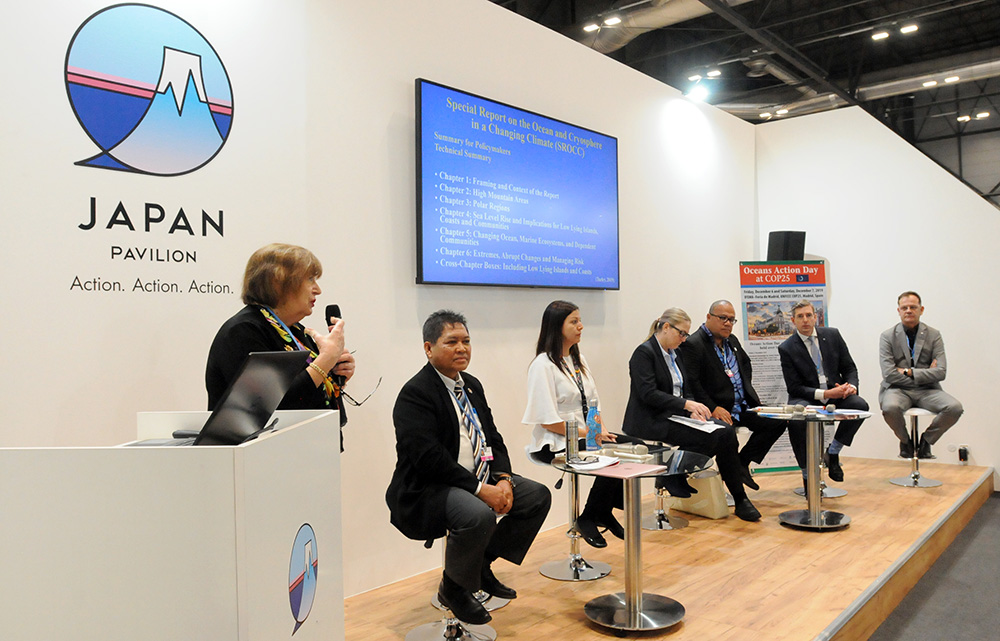
L-R: Biliana Cicin-Sain, President, Global Ocean Forum, and Roadmap to Oceans and Climate Action (ROCA) Initiatiave; Safri Burhanuddin, Deputy Minister for Human Resources, Science, Technology and Maritime Culture, Coordinating Ministry for Maritime Affairs, Indonesia;Haydée Rodrígez Romero, Vice-Minister, Ministry of Environment and Coastal Affairs, Costa Rica; Helen Ågren, Ambassador for the Ocean, Ministry for Foreign Affairs, Sweden; Taholo Kami, Special Representative for the Ocean Pathway, COP 23 Presidency Secretariat, Fiji; Nick Hardman-Mountford, Head of Oceans and Natural Resources, Commonwealth Secretariat; and Manuel Barange, Director, Fisheries and Aquaculture Policy and Resources Division, FAO
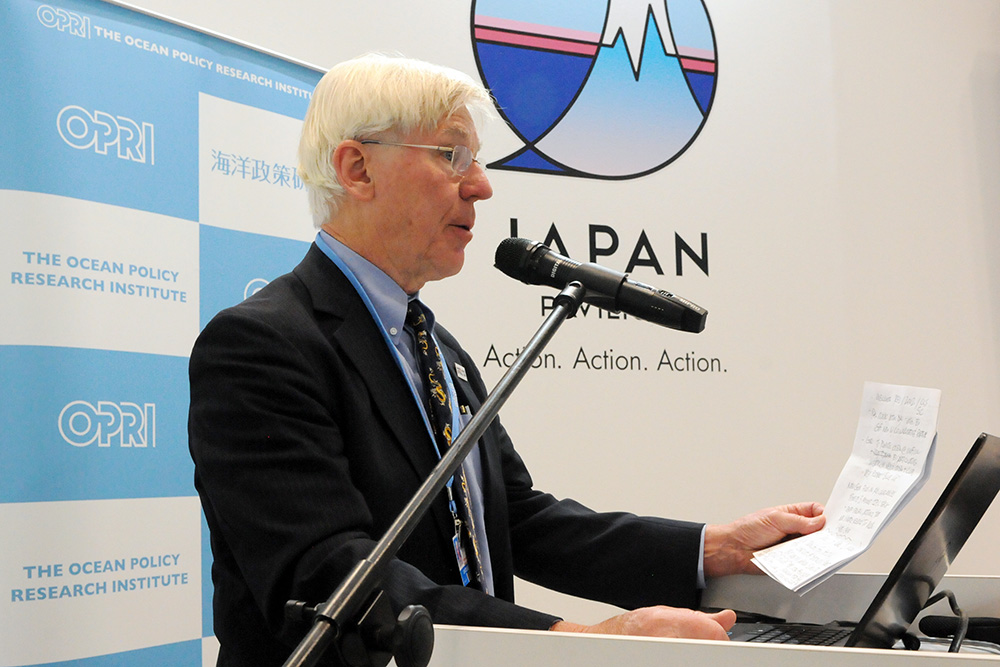
Richard Delaney, Global Ocean Forum
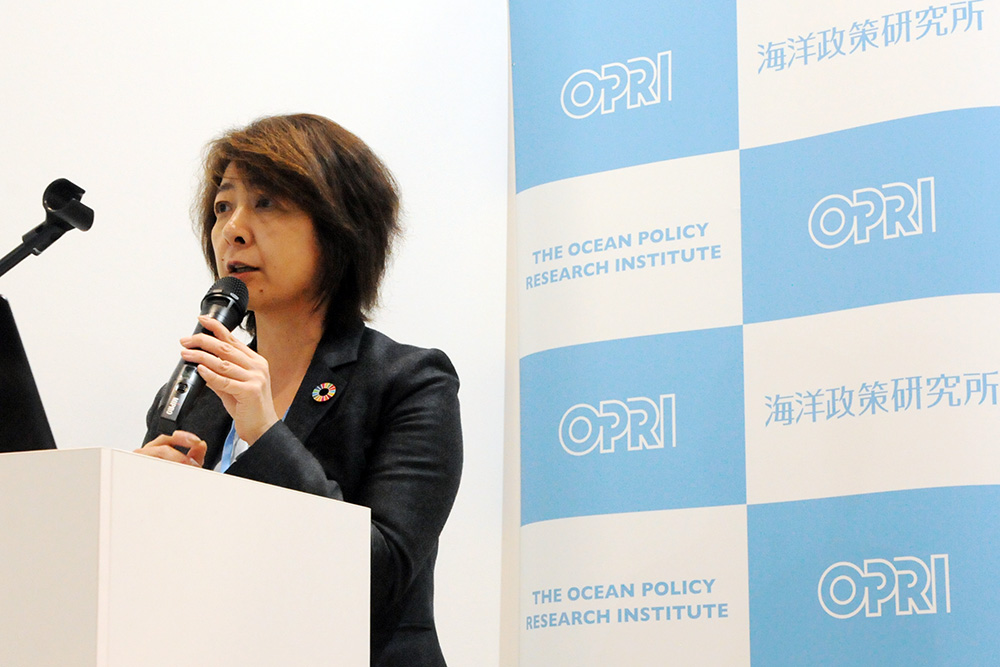
Keiko Segawa, Ministry of the Environment, Japan
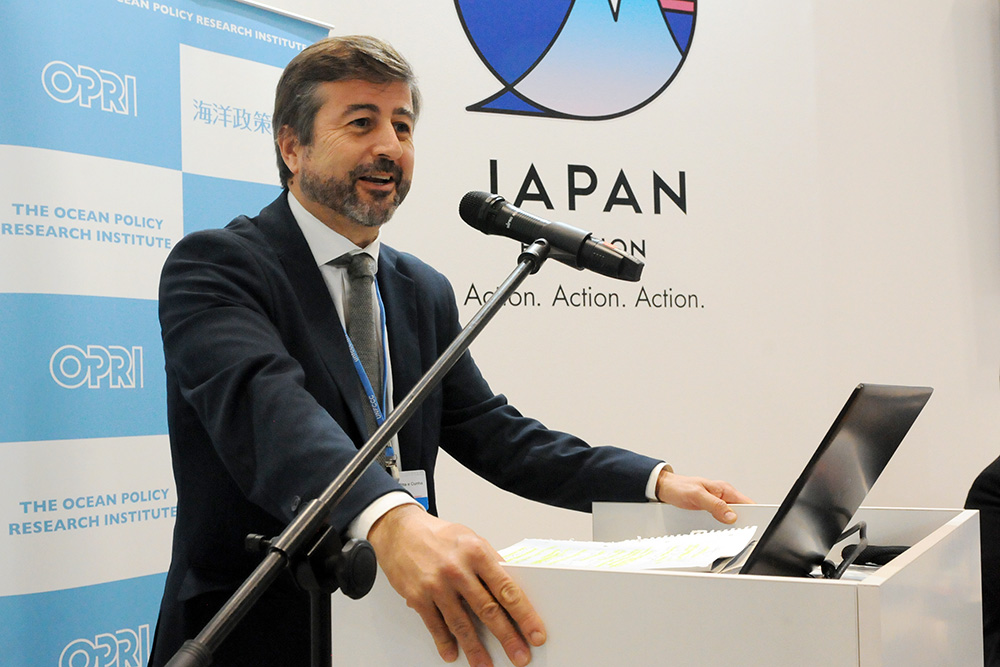
Co-Chair Tiago Pitta e Cunha, CEO, Oceano Azul Foundation, Portugal
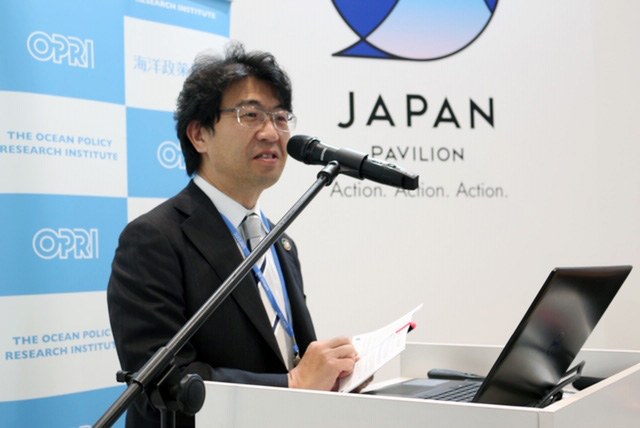
Co-Chair Atsushi Sunami, President, Ocean Policy Research Institute, Sasakawa Peace Foundation
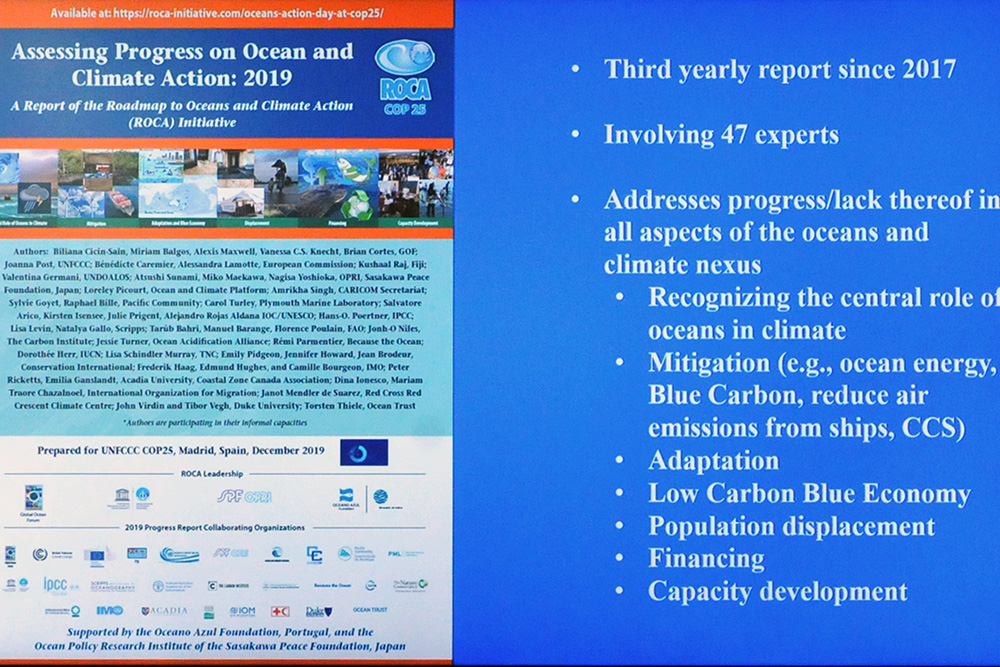
A slide from Biliana Cicin-Sain’s presentation
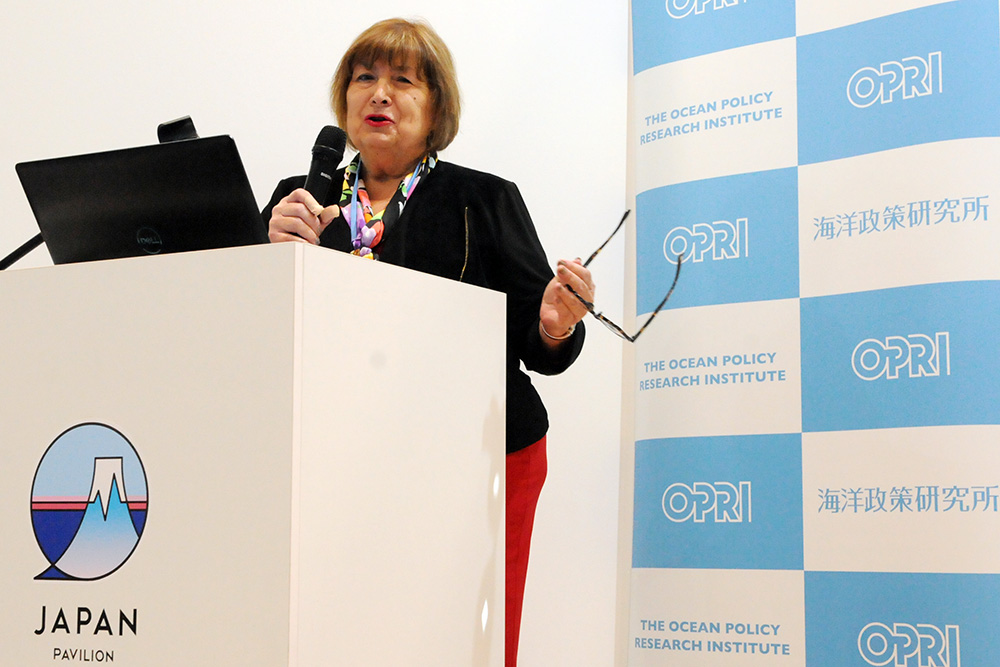
Biliana Cicin-Sain, President, Global Ocean Forum, and ROCA Initiatiave
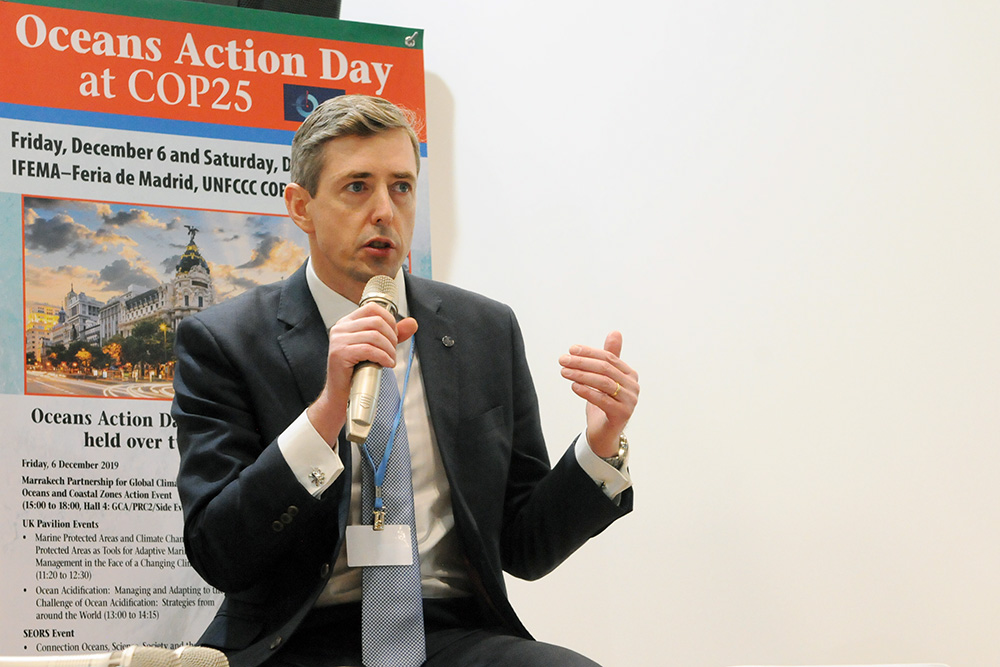
Nick Hardman-Mountford, Head of Oceans and Natural Resources, The Commonwealth Secretariat
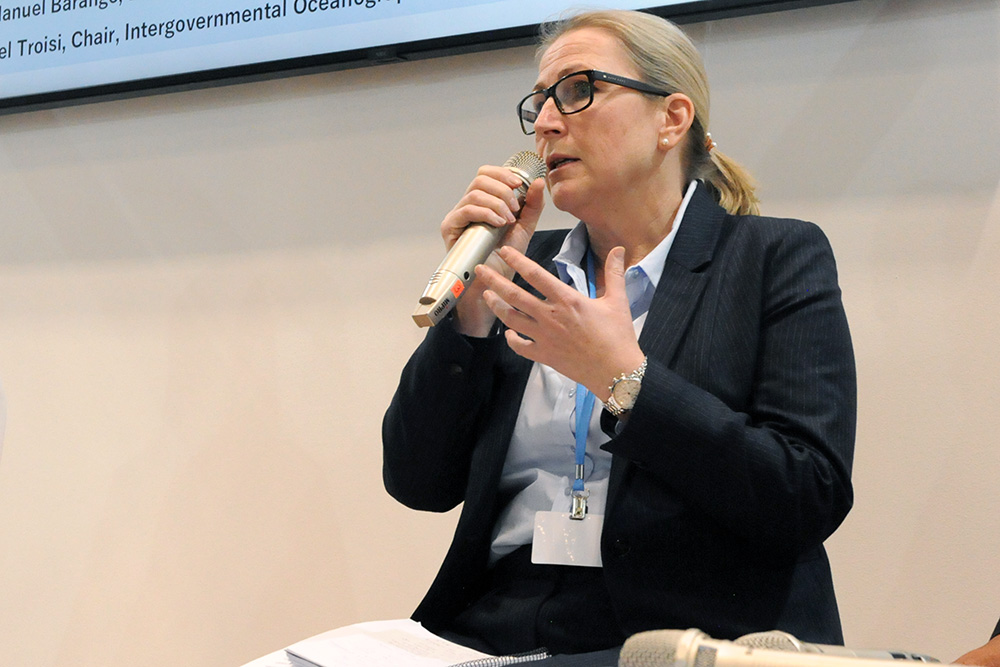
Helen Ågren, Ambassador for the Ocean, Ministry for Foreign Affairs, Sweden
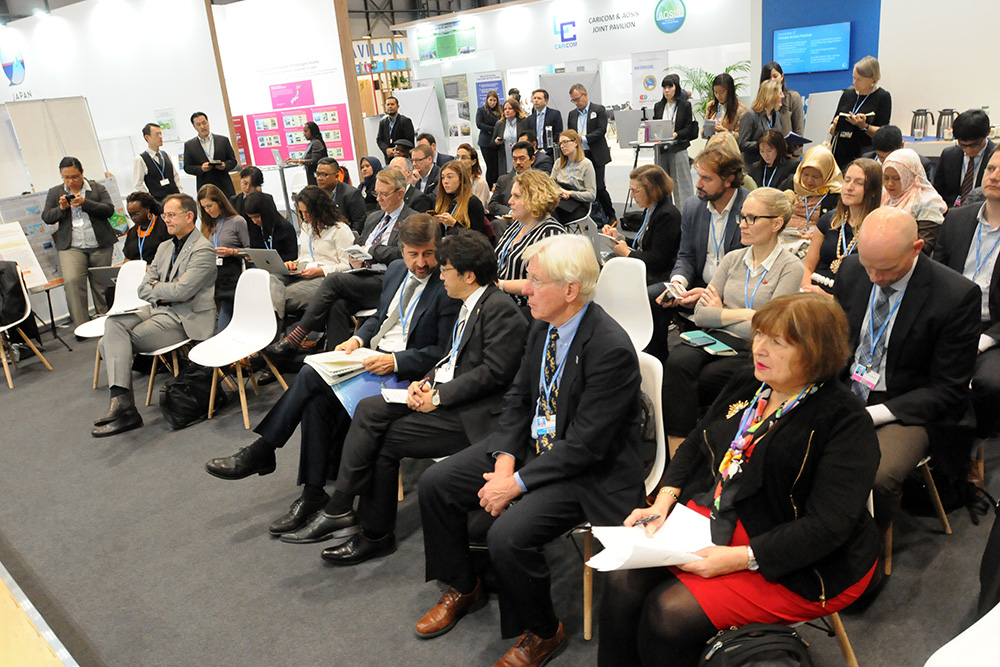
Participants listen to panelists
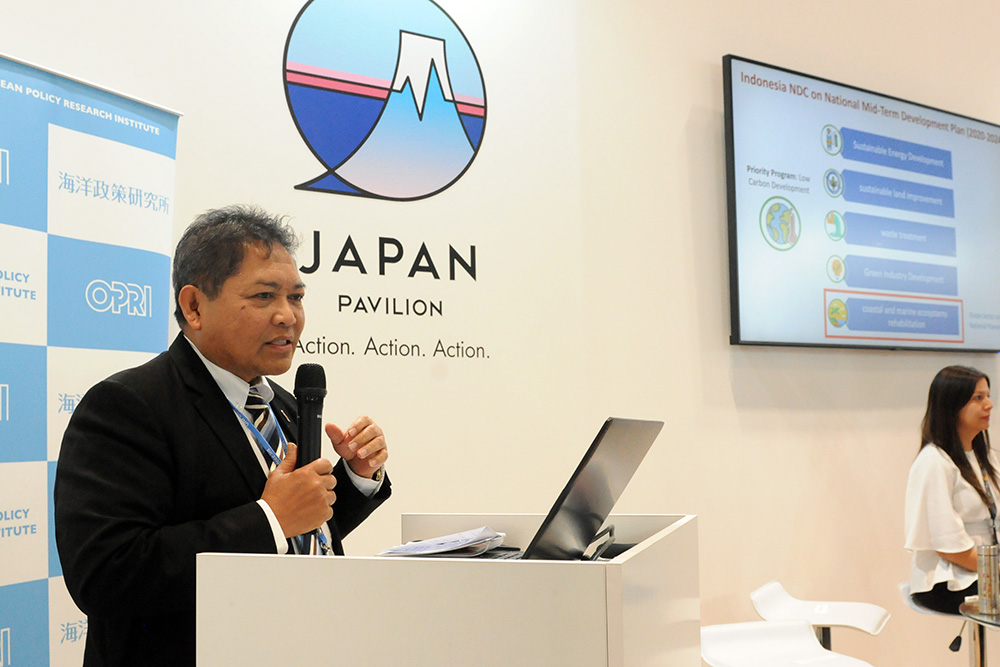
Safri Burhanuddin, Deputy Minister for Human Resources, Science, Technology and Maritime Culture, Coordinating Ministry for Maritime Affairs, Indonesia
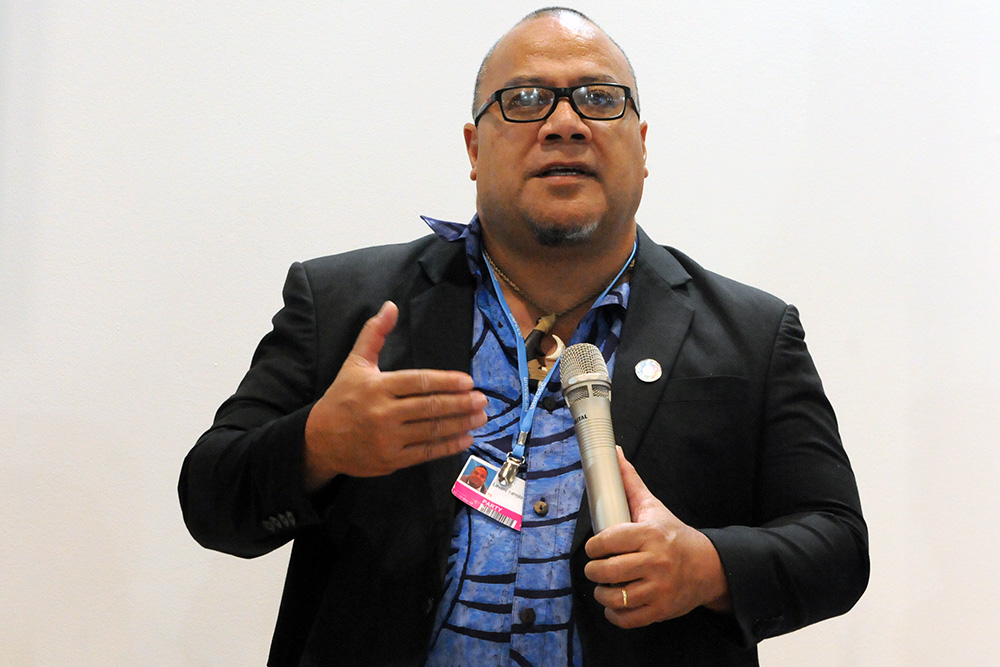
Taholo Kami, Special Representative for the Ocean Pathway, COP 23 Presidency Secretariat, Fiji
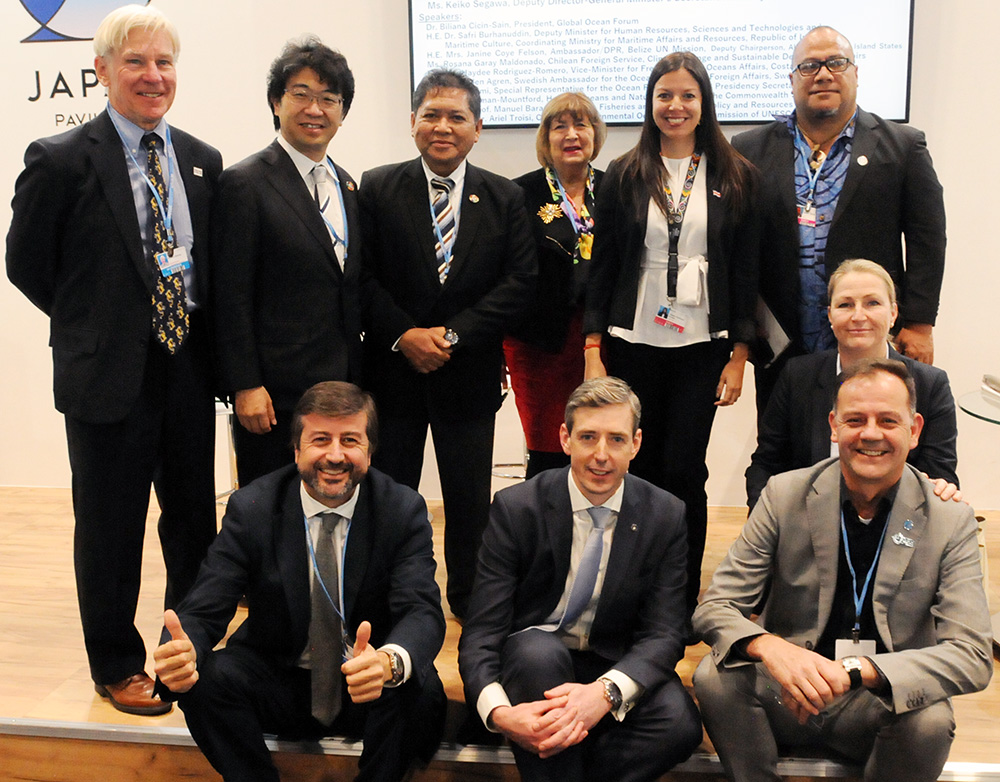
Group photo at the end of the session
Incorporating Ocean-Related Options in Nationally Determined Contributions (NDCs)7
The session was organized by Because the Ocean Initiative and the Ocean and Climate Platform.
Co-Chairs Rémi Parmentier, Coordinator, Because the Ocean Initiative, and Loreley Picourt, Secretary General, Ocean and Climate Platform, identified measures for the integration of key ocean issues within NDCs, including taking into account recommendations contained in the recent Because the Ocean and Institute for Sustainable Development and International Relations (IDDRI) publications on integrating the ocean into NDCs.
Parmentier drew attention to the Because the Ocean Initiative’s report, Ocean for Climate, which discusses ocean-related measures in climate strategies, including providing guidelines on integrating oceans into NDCs.
Jean-Pierre Gattuso, IDDRI, citing the publication, Opportunities for Increasing Ocean Action in Climate Action Strategies, noted that the Paris Agreement “has the potential to avoid the unmanageable, but we need to be prepared to manage the unavoidable.”
Lisa Levin, Scripps Institution of Oceanography, University of California, San Diego, noted that Annex I countries did not mention the ocean in their initial NDCs, and expressed hope that the 2020 NDCs will contain nature-based solutions. She urged policymakers to pay greater attention to the ocean-climate nexus in the high seas, which comprise 60% of the ocean.
Joachim Claudet, French National Center for Scientific Research, spoke on how MPAs can contribute to mitigation and adaptation, including ocean acidification and deoxygenation, and creating barriers to sea-level rise.
Emily Pidgeon, Conservation International, emphasized the importance of blue carbon, urging countries to include ecosystems in their national greenhouse gas inventories, and highlighted her organization’s Guide to Including Nature in NDCs.
Karen Sack, Managing Director, Ocean Unite, said that unabated, climate change will cause over 90% loss of the current USD 36 billion revenue from coral reefs, highlighting the need to include the insurance sector in modeling climate risk, and developing fiscal mitigation policies and products.
Rémi Collombet-Gourdon, Ocean Energy Europe, underlined that NDCs are useful if they are ambitious and push policymakers towards a renewable energy pathway. He highlighted that ocean-thermal energy technologies can produce decarbonized energy in a predictable way, while providing jobs.
Monica Verbeek, Executive Director, Seas At Risk, called for full decarbonization of the shipping industry by 2050 noting, inter alia, that the reduction of ship-speed by 20% translates to a 34% reduction in carbon emissions.
Marc Van Peteghem, CEO, Van Peteghem Lauriot-Prévost (VPLP Design), stressed that wind energy combined with the reduction in ship speeds is imperative to the reduction of emissions from the shipping sector.
Cameron Diver, Deputy Director-General, Pacific Community, called for the translation of ambition to action, noting that the survival of the islands depends on urgent action by 2030. Noting the co-benefits for biodiversity and culture, he pointed to the “super year” 2020, which has an ocean focus and urged policymakers to take on progressive actions for oceans and climate.
During discussions, participants took note of opportunities for partnership with Africa thorough the Africa Day of Seas and Oceans, the Africa Strategy of Oceans, and the work of the Africa Blue Economy Champion, who is currently the President of Seychelles.
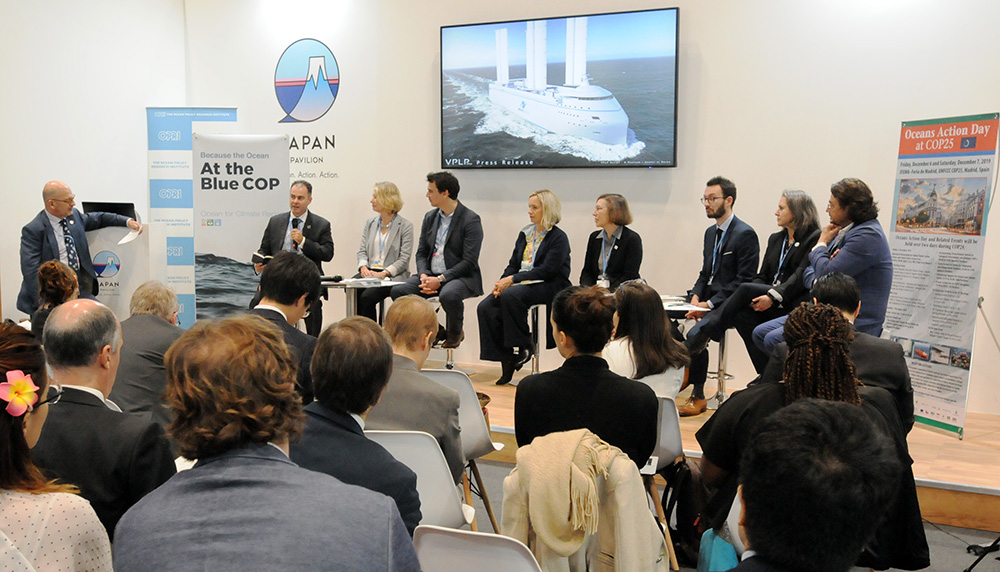
L-R: Co-Chair Rémi Parmentier, Coordinator, Because the Ocean Initiative; Cameron Diver, Deputy Director-General, Pacific Community; Monica Verbeek, Executive Director, Seas At Risk; Joachim Claudet, National Center for Scientific Research; Emily Pidgeon, Senior Director, Strategic Marine Initiatives, Conservation International; Lisa Levin, Scripps Institution of Oceanography, University of California, San Diego; Rémi Collombet-Gourdon, Policy Officer, Ocean Energy Europe; Karen Sack, Managing Director, Ocean Unite; and Marc Van Peteghem, CEO, Van Peteghem Lauriot-Prévost (VPLP Design)
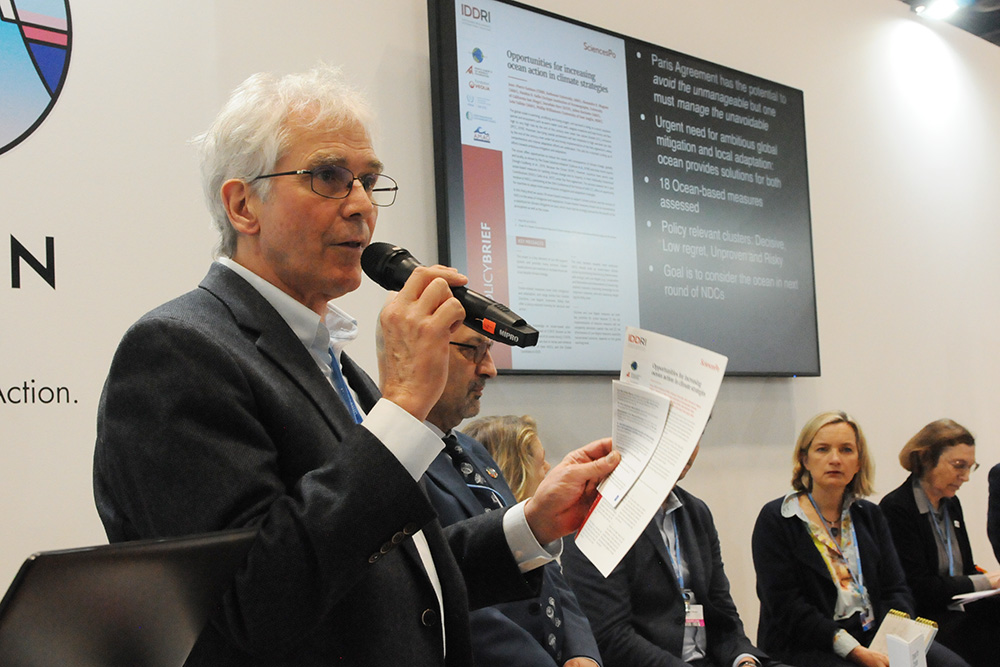
Jean-Pierre Gattuso, IDDRI
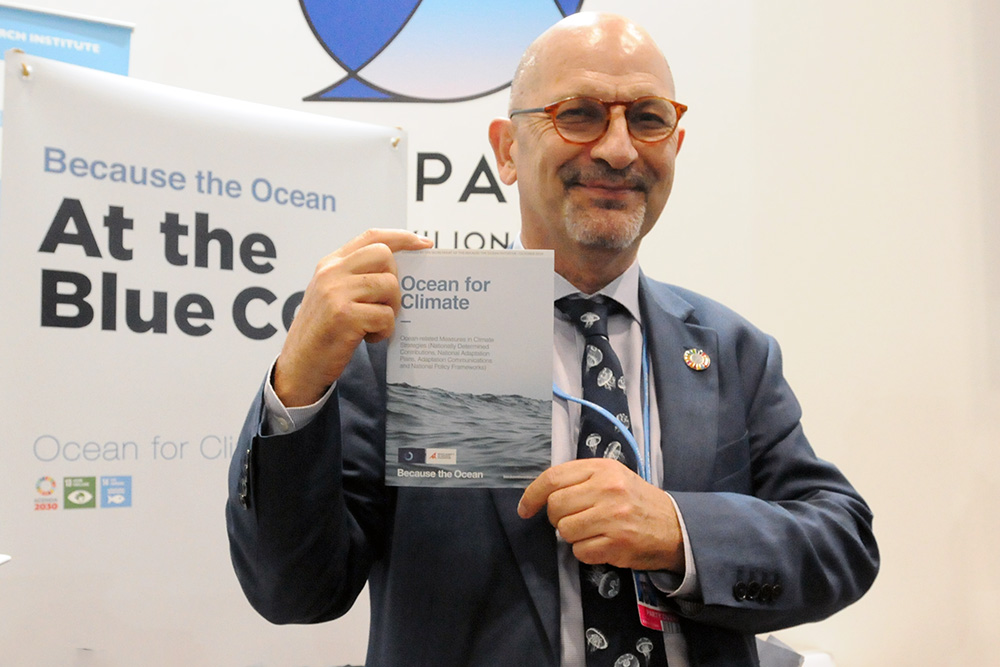
Co-Chair Rémi Parmentier, Coordinator, Because the Ocean Initiative
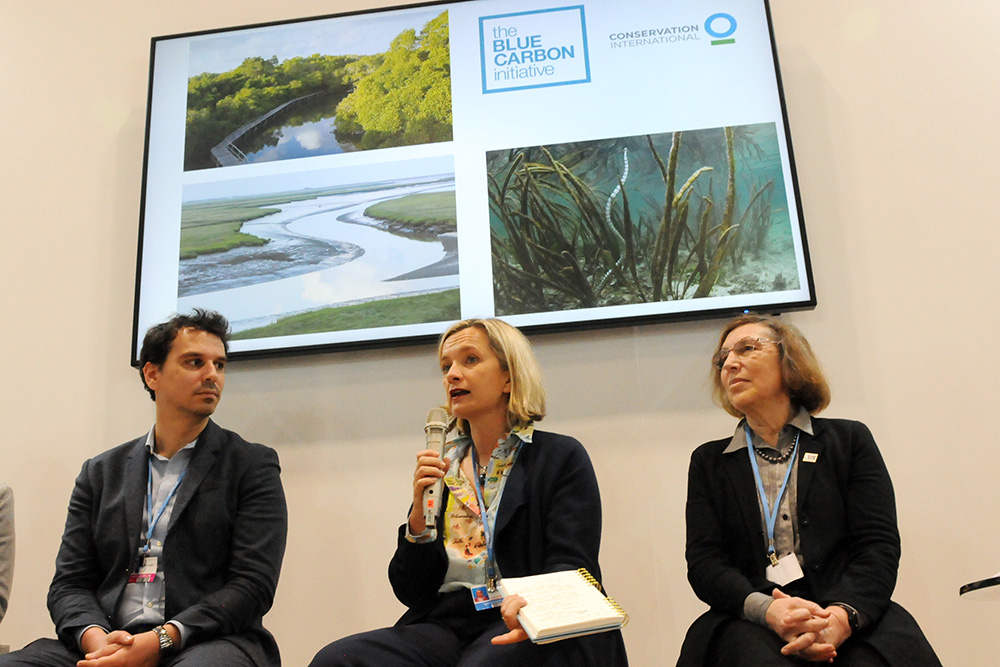
L-R: Joachim Claudet, National Center for Scientific Research; Emily Pidgeon, Senior Director, Strategic Marine Initiatives, Conservation International; and Lisa Levin, Scripps Institution of Oceanography, University of California, San Diego
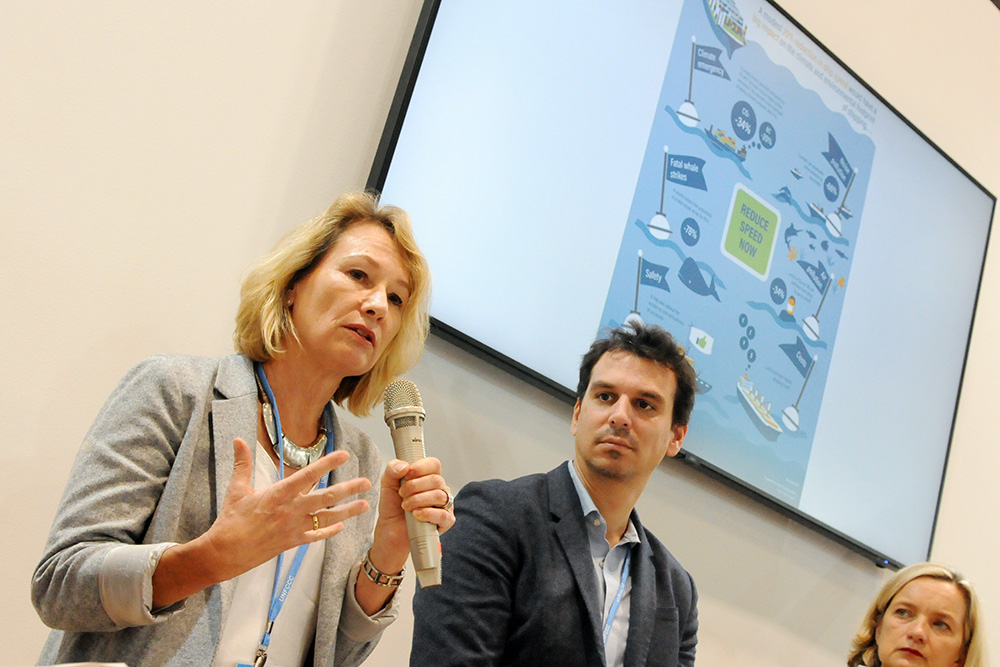
Monica Verbeek, Executive Director, Seas At Risk
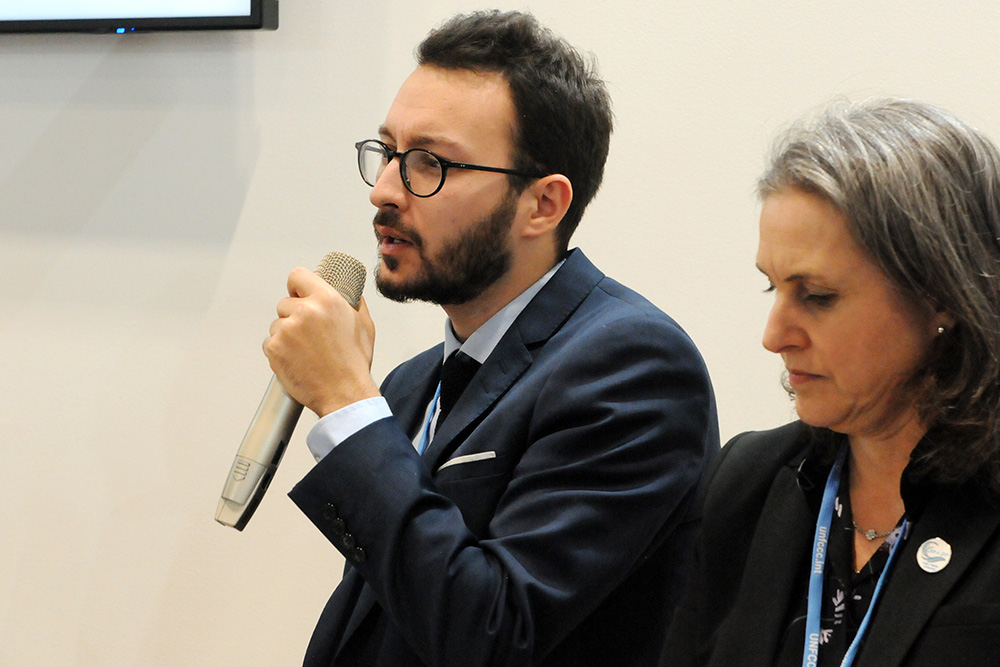
Rémi Collombet-Gourdon, Policy Officer, Ocean Energy Europe
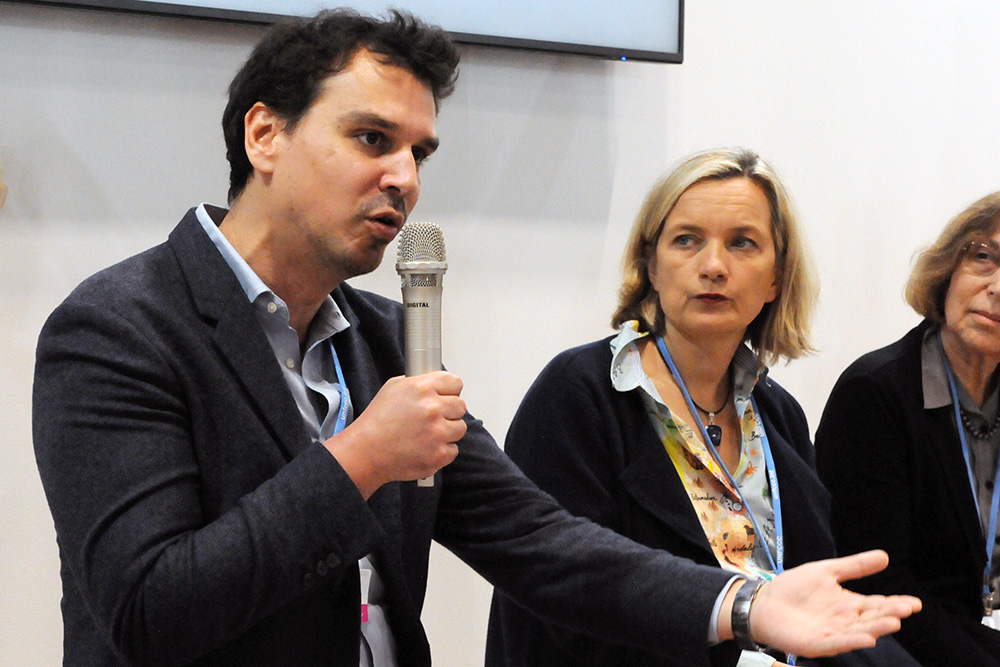
Joachim Claudet, National Center for Scientific Research
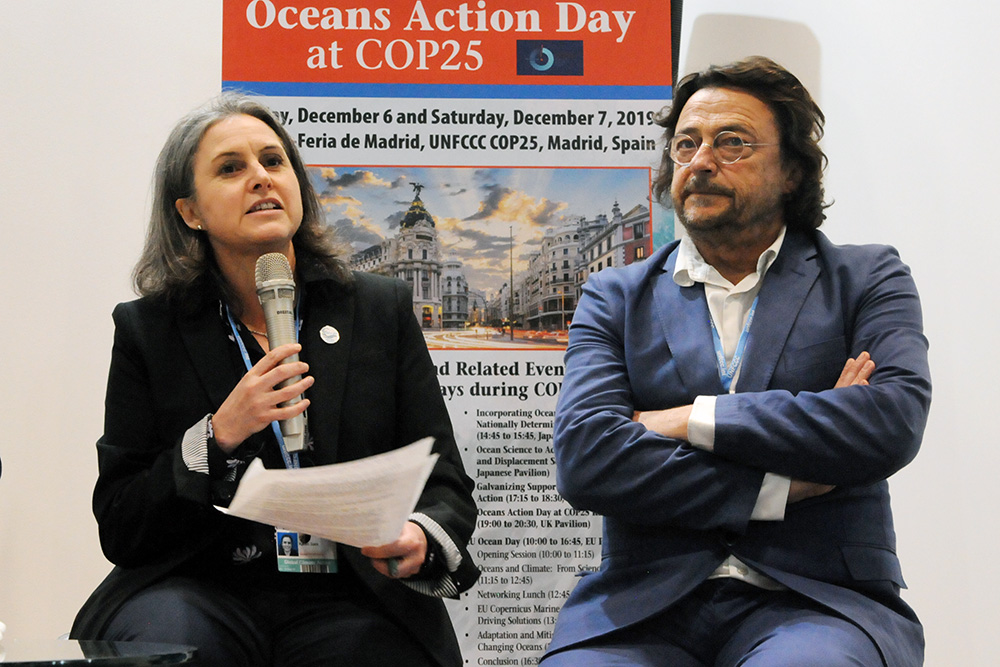
Karen Sack, Managing Director, Ocean Unite, and Marc Van Peteghem, CEO, Van Peteghem Lauriot-Prévost (VPLP Design)
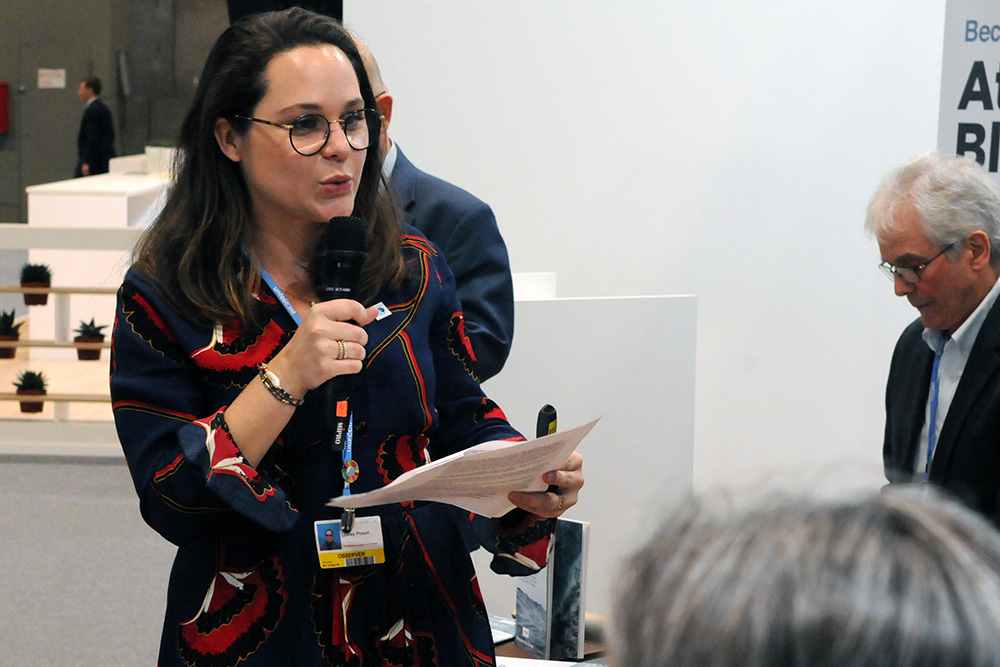
Co-Chair Loreley Picourt, Secretary General, Ocean and Climate Platform
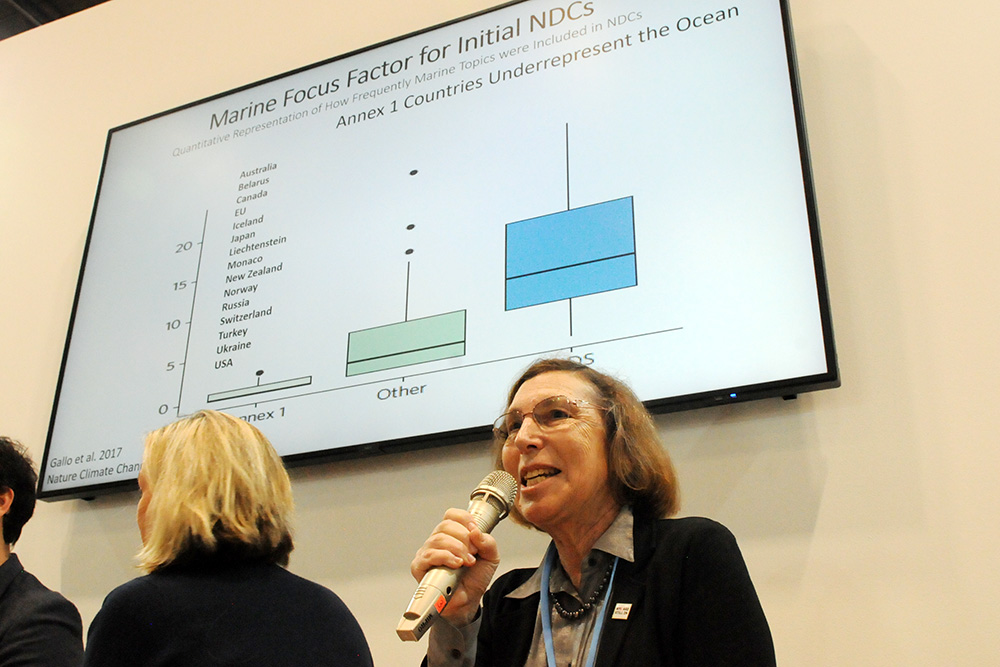
Lisa Levin, Scripps Institution of Oceanography, University of California, San Diego
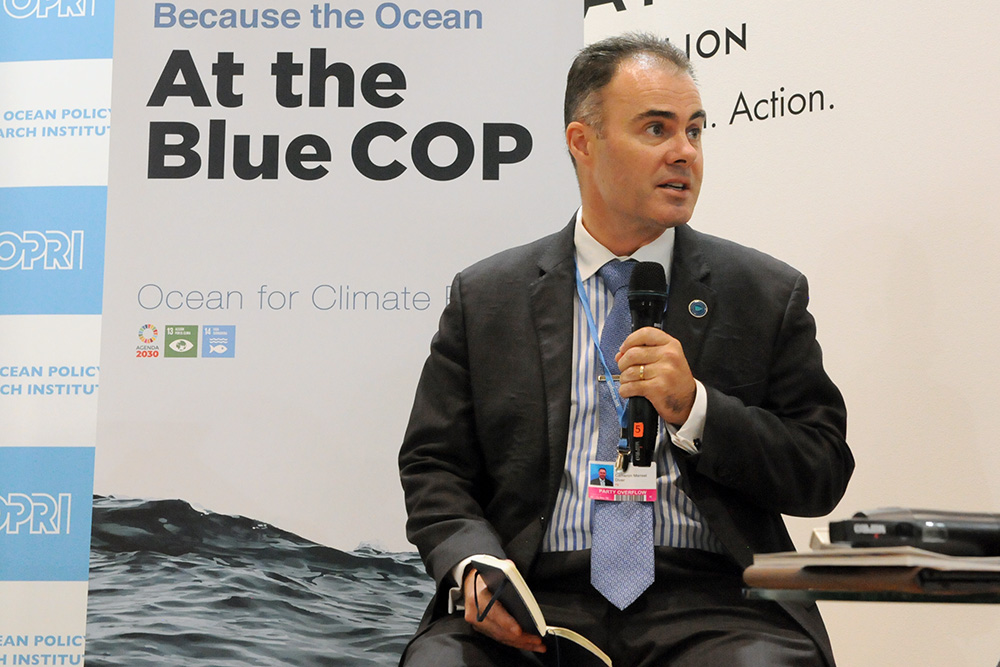
Cameron Diver, Deputy Director-General, Pacific Community

A participant takes a photo of the panel.
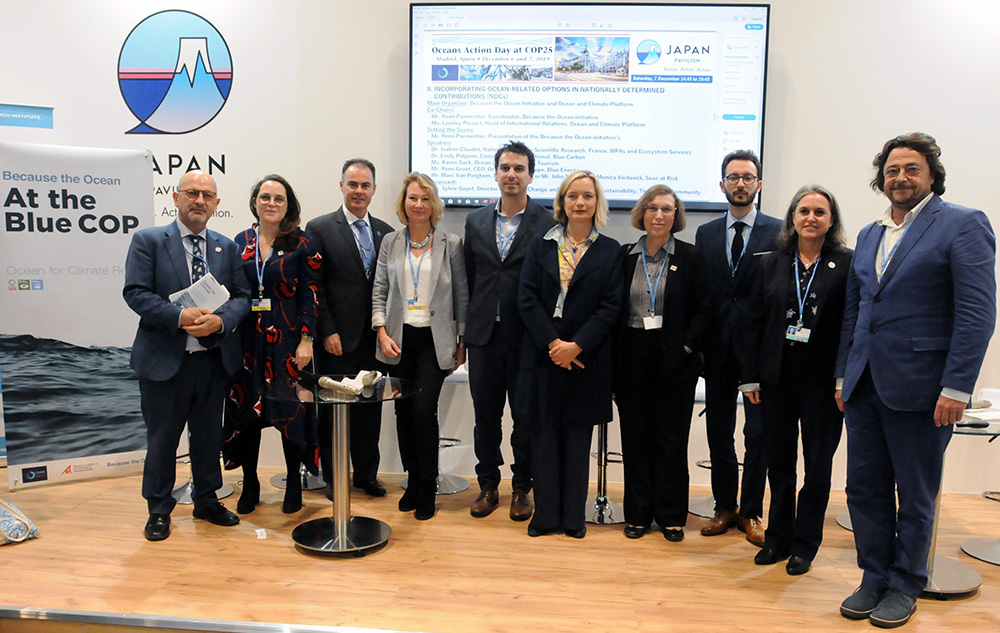
Group photo at the end of the session
Ocean Science to Action for Adaptation and Displacement Solutions
This panel was organized by: Ocean Policy Research Institute, Sasakawa Peace Foundation, Japan; Global Ocean Forum; and Coastal Zone Canada Association.
Participants considered perspectives on how to take advantage of existing knowledge and opportunities associated with climate change adaptation and climate-related displacement issues and policies.
Miko Maekawa, Sasakawa Peace Foundation, Japan, and Peter Ricketts, Coastal Zone Canada Association, co-chaired this panel.
Citing the ROCA report, Ricketts noted that while there is evidence of adaptation occurring across the world, innovative adaptation mechanisms and linkages to mitigation to tackle the immediate threats of the climate emergency are needed. Maekawa discussed the evidence on climate change, migration and vulnerability, highlighting that those suffering the highest exposure to climate disasters have the least capacity to adapt.
Stressing that fishermen care about the health of the ocean and calling on people to “eat more fish” as a way to mitigate climate change, Javier Garat, Secretary General, Spanish Fishing Confederation, and Chair of the International Coalition of Fisheries Associations (ICFA), highlighted that fishing vessels are collecting marine litter and are part of the circular economy, and MPAs are not the only solution to marine conservation.
Espen Ronnenberg, Climate Change Adviser, Secretariat of the Pacific Regional Environment Programme (SPREP), highlighted displacement policies and practices, pointing to island land tenure systems, which can exacerbate or ameliorate the challenges related to internal relocations.
Mariam Traore Chazalnoel, Associate Expert, Migration, Environment and Climate Change, International Organization for Migration (IOM), highlighted opportunities for strengthening adaptation measures through the Global Compact for Safe, Orderly and Regular Migration (GCM), an intergovernmental non-binding agreement that focuses on climate related migrations and displacement.
Florence Geoffroy, Associate Liaison Officer on Climate Change and Disaster Displacement, UN Refugee Agency (UNHCR), reported that about 22 million people have been displaced by climate disasters. She said UNHCR, through the Platform on Disaster Displacement, is supporting protections for people displaced due to climate-related disasters and climate change.
Donna Lagdameo, Senior Policy Advisor and Asia Pacific Focal Point, Red Cross Red Crescent Climate Centre, called for an integrated risk management approach to bridge the climate-disaster divide, underscored the importance of forecast-based actions to increase resilience, as well as community-centered and driven actions.
Ingrid Timboe, Policy Director, Alliance for Global Water Adaptation (AGWA), highlighted the importance of sediment flows for marine ecosystems, noting the need for appropriate ecosystem management approaches and calling for resilient water management to build and maintain coastal ecosystems to mitigate disasters.
During the discussion, participants discussed, inter alia: opportunities available for cross-sectoral application of adaptation mechanisms and the use of indigenous knowledge; and the relationship that Pacific Islands have with shipping companies to ship recyclable wastes free of charge. Participants also highlighted the importance of actionable forecast information and the desperate need for mitigation and adaptation to avoid displacement.
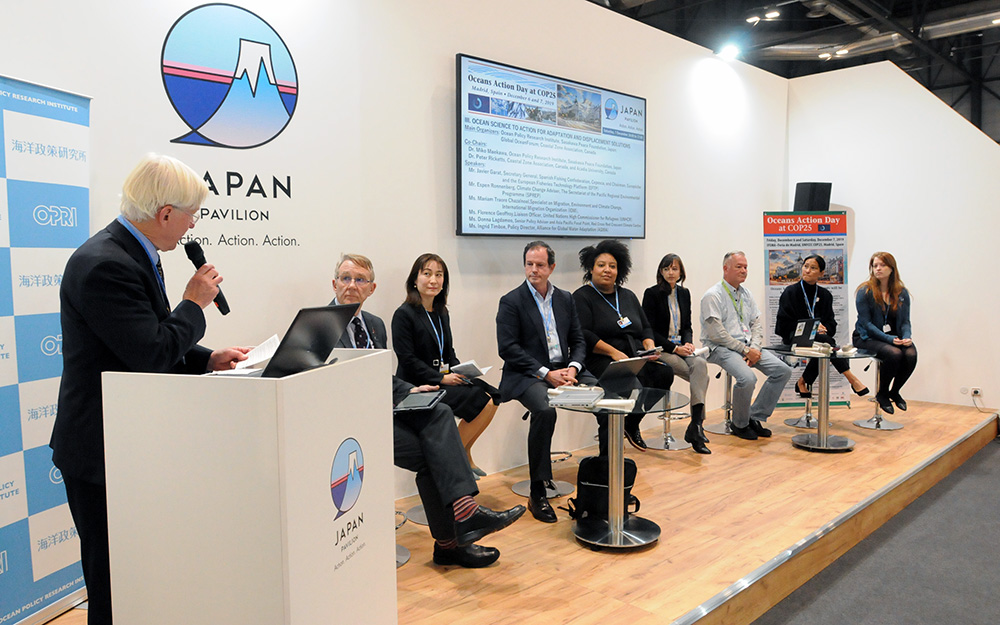
L-R: Richard Delaney, Global Ocean Forum; Co-Chair Peter Ricketts, Coastal Zone Canada Association; Co-Chair Miko Maekawa, Ocean Policy Research Institut, Sasakawa Peace Foundation, Japan; Javier Garat, Secretary General, Spanish Fishing Confederation and ICFA Chair; Mariam Traore Chazalnoel, Associate Expert, Migration, Environment and Climate Change, IOM; Florence Geoffroy, Associate Liaison Officer on Climate Change and Disaster Displacement, UNHCR; Espen Ronnenberg, Climate Change Adviser, SPREP; Donna Lagdameo, Senior Policy Advisor and Asia Pacific Focal Point, Red Cross Red Crescent Climate Centre; and Ingrid Timboe, Policy Director, AGWA
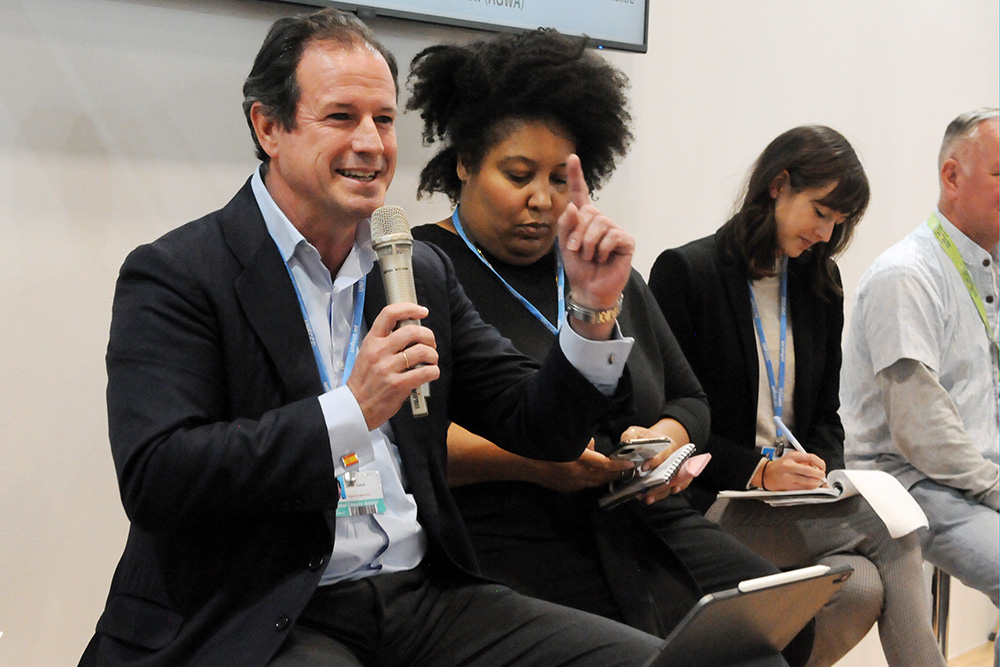
Javier Garat, Secretary General, Spanish Fishing Confederation, and ICFA Chair
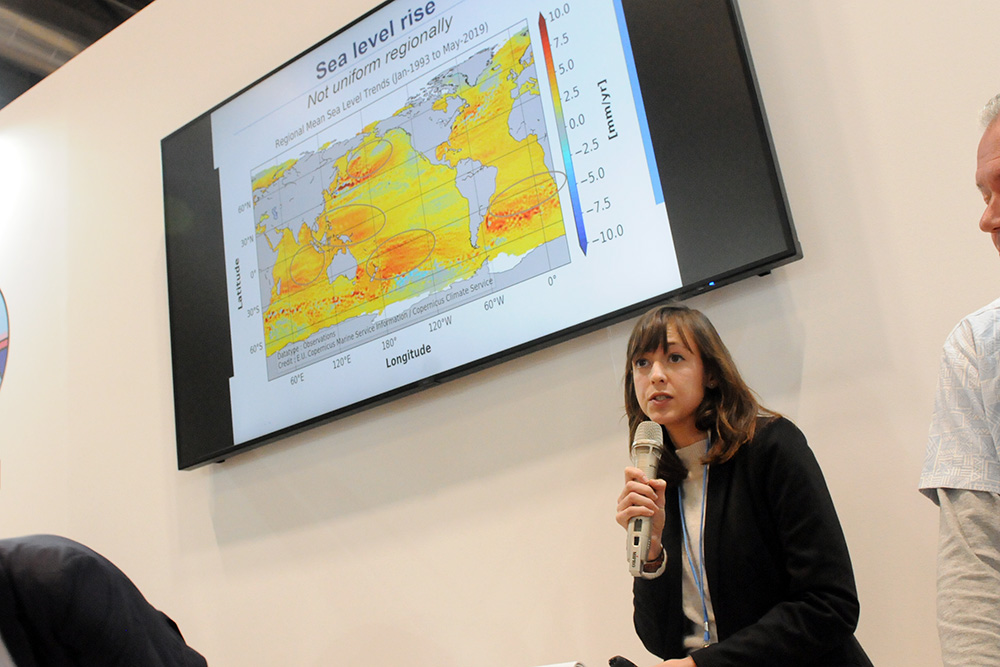
Florence Geoffroy, Associate Liaison Officer on Climate Change and Disaster Displacement, UNHCR
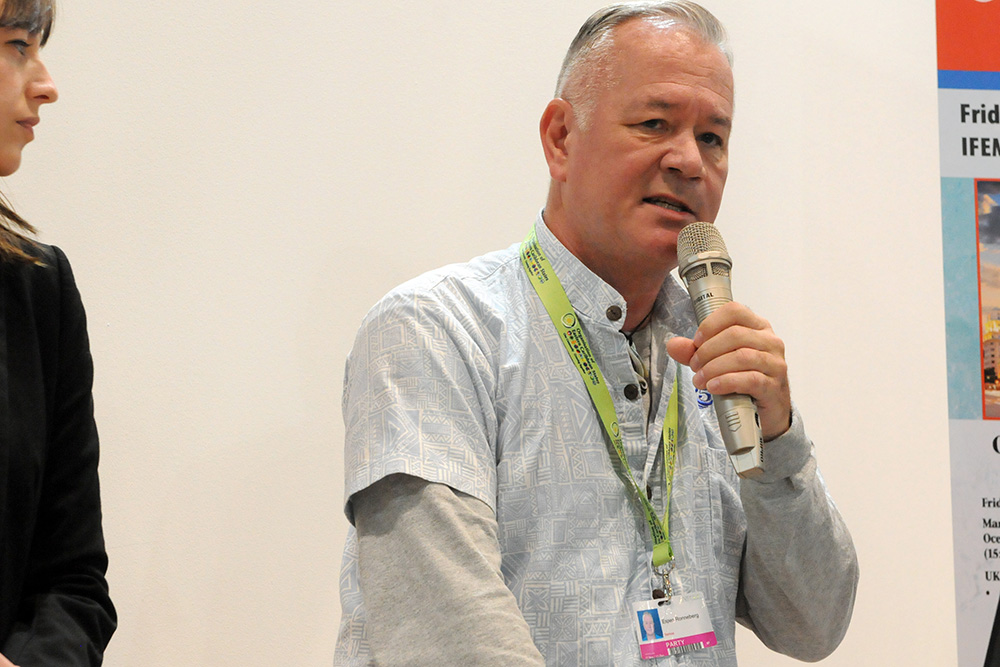
Espen Ronnenberg, Climate Change Adviser, SPREP
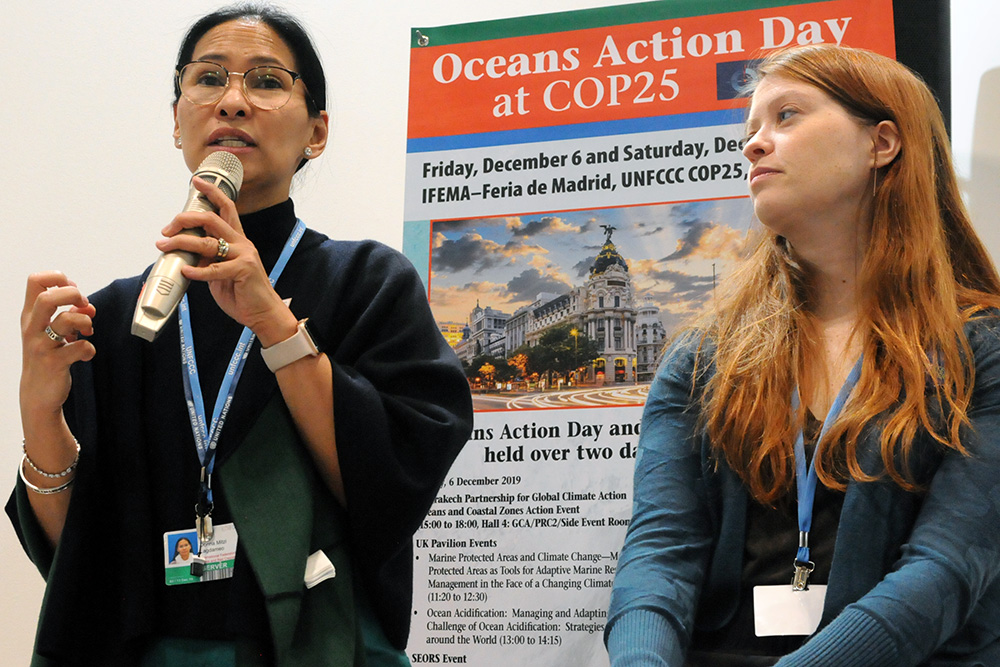
Donna Lagdameo, Senior Policy Advisor and Asia Pacific Focal Point, Red Cross Red Crescent Climate Centre, and Ingrid Timboe, Policy Director, AGWA
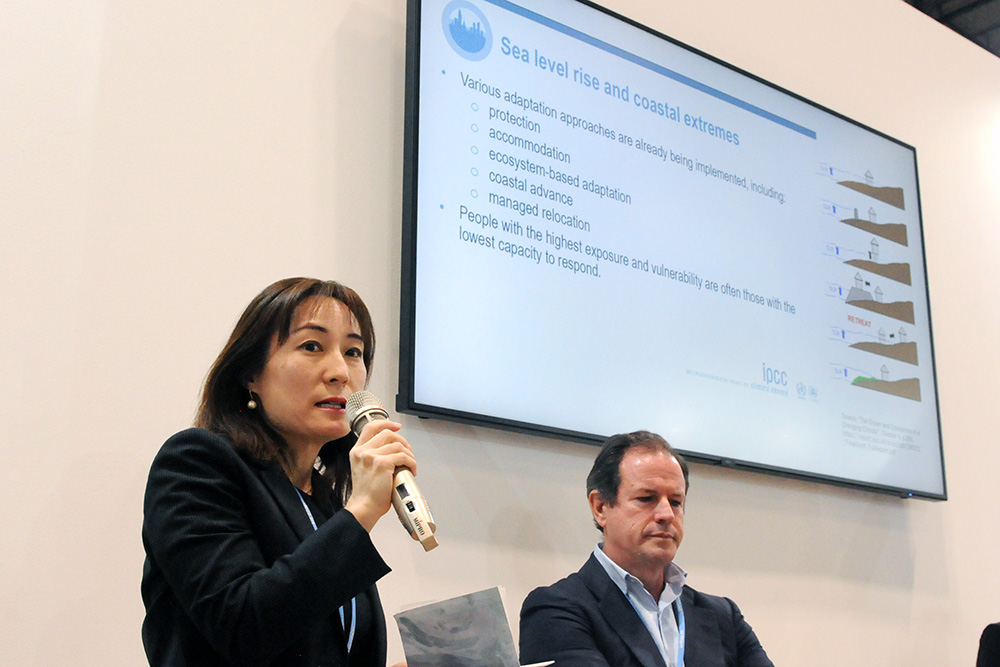
Co-Chair Miko Maekawa, Ocean Policy Research Institut, Sasakawa Peace Foundation, Japan
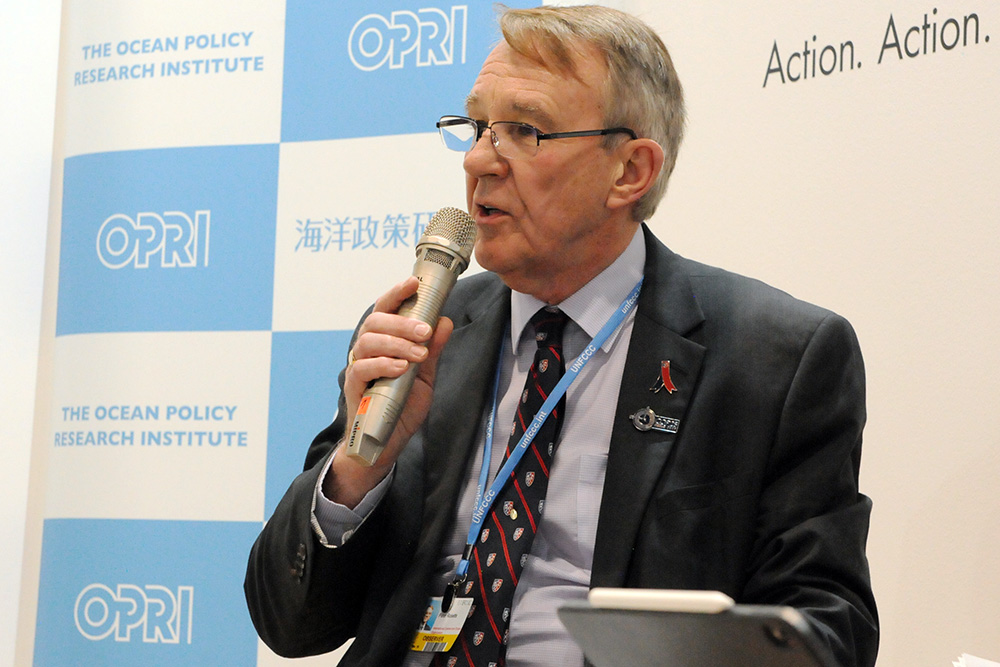
Co-Chair Peter Ricketts, Coastal Zone Canada Association
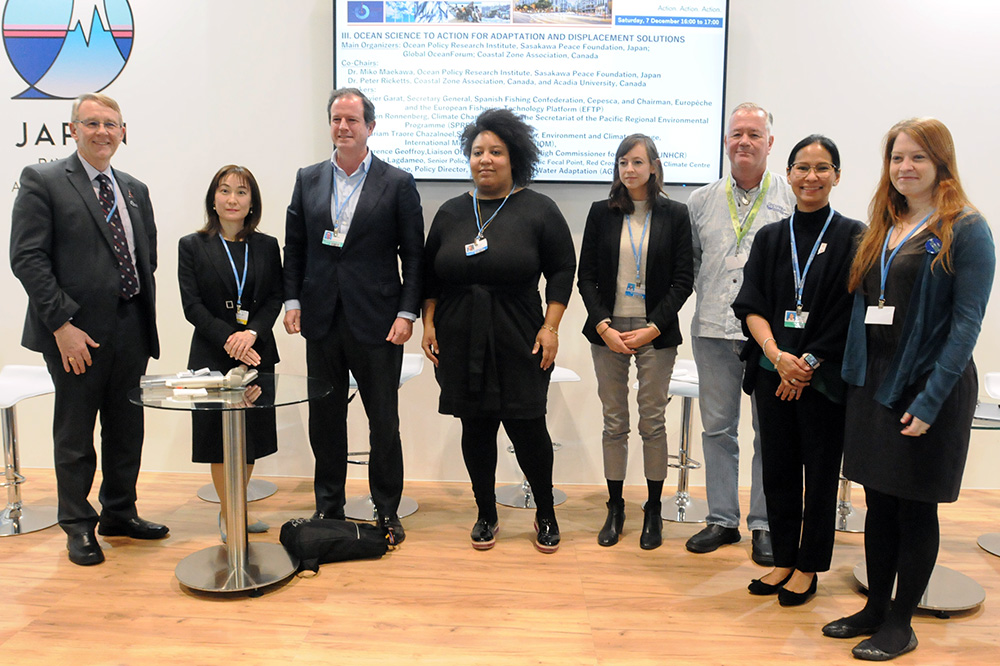
Group photo at the end of the session
Galvanizing Support for Oceans and Climate Action
Organized by the Government of Chile and the Global Ocean Forum
This session, co-chaired by Biliana Cicin-Sain, President, Global Ocean Forum, and Richard Delaney, Global Ocean Forum, brought together stakeholders to discuss pre-2020 climate action, and raising ambition to achieve the Paris Agreement goals on oceans and coastal zones.
Rosana Garay Maldonado, Chilean Foreign Service, Climate Change and Sustainable Development Affairs, noted that 2019 has seen the growth of the “blue community,” stressing that the ocean is an essential part of Chile’s national identity, leading to the labelling of COP 25 as the “Blue COP.”
Amb. Peter Thomson, UN Special Envoy for the Ocean, stressed the need to reverse the oceans crisis, and to break down the silos between oceans, biodiversity, and climate in order to reverse the human-driven destruction.
Gustavo Fonseca, Global Environment Facility (GEF), announced new project funding, to be considered by the 58th GEF Council Meeting in 2019, aimed at strengthening MPAs to address carbon sequestration, biodiversity, and fisheries.
Virginijus Sinkevičius, Environment, Oceans and Fisheries, European Commission, urged building momentum from 2020 events and activities including the 2020 UN Ocean Conference and the IUCN World Conservation Congress 2020, among others.
Anders Geertsen, Nordic Council of Ministers Secretariat, reported work towards carbon neutrality in the Nordic region, including through carbon capture and storage. He underscored the need for expert research to facilitate regional ocean-climate actions.
Cristelle Pratt, Deputy Secretary General, Pacific Islands Forum Secretariat, underscored the importance of the ocean for Pacific Islands nations and the range of serious challenges being faced by Pacific island communities as a result of climate change. She highlighted calls for a UNFCCC workshop under the Subsidiary Body for Scientific and Technological Advice (SBSTA) and on the climate-ocean nexus in 2020, stressing that multilateralism must be more effective to “honour the ocean.”
Amb. Álvaro Mendonça e Moura, Ministry of Foreign Affairs, Portugal, reported on preparations for the 2020 UN Ocean Conference, to be held in Lisbon, Portugal, from 2-6 June, which will be an opportunity to reinforce the ocean-climate nexus, assess progress, and chart the way forward.
James Njiru, Director of Kenya Marine and Fisheries Research Institute, reported on preparations for the 2020 UN Ocean Conference on the part of Kenya as co-host. He reported, inter alia, that the first Sustainable Blue Economy Conference in Nairobi in 2018 resulted in the Nairobi Statement of Intent on Advancing the Global Sustainable Blue Economy, and commitments to act on the ocean-climate nexus.
Tiago Pitta e Cunha, CEO, Oceano Azul Foundation, Portugal, reported on the mobilization of civil society, especially the philanthropic community, for the 2020 UN Ocean Conference in order to influence the relationship between people and nature. He highlighted that, if nature is our most valuable asset, then we should make it profitable for business.
Patricia Fuller, Ambassador for Climate Change, Canada, reported that her country is spearheading action on marine plastics globally through the Ocean Plastics Charter. Pointing to the Ocean Risk and Resilience Action Alliance, she noted the need for philanthropic and private capital to address challenges in the ocean-climate nexus.
Nani Hendiarti, Director, Maritime Science and Technology, Indonesia, proposed actions to accelerate ocean and climate actions including incorporating oceans in NDCs, suggesting that this could be undertaken through raising the profile of mangroves in climate adaptation.
Ariel Troisi, Chair, IOC-UNESCO, stressed that 2020 will be a great year for oceans with the 2020 Ocean Conference, the Our Ocean Conference in Palau, and the Convention on Biological Diversity COP 15.
In the ensuing discussion, participants considered how best to engage with the private sector and the need to raise the price of carbon to incentivize decarbonization.
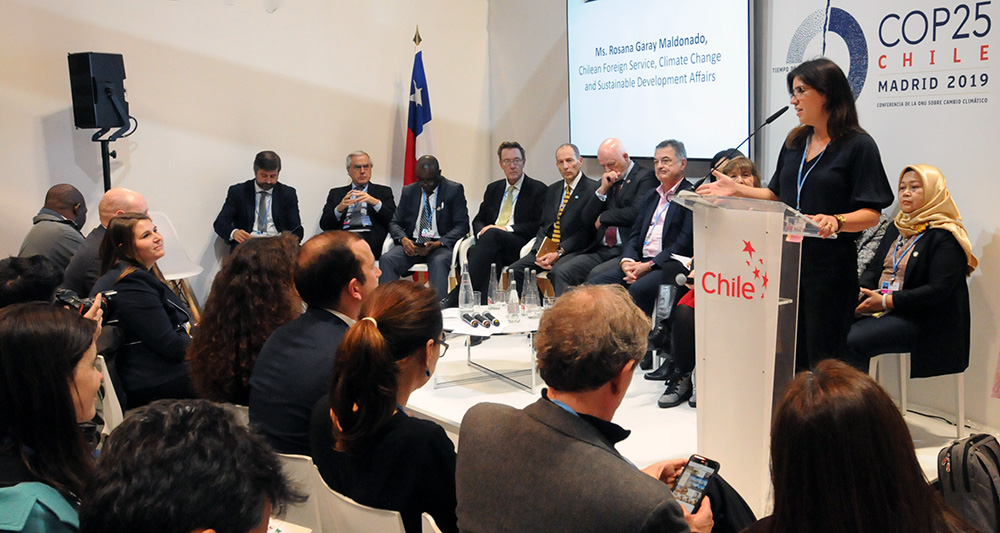
Rosana Garay Maldonado, Chilean Foreign Service, Climate Change and Sustainable Development Affairs, makes introductory remarks.
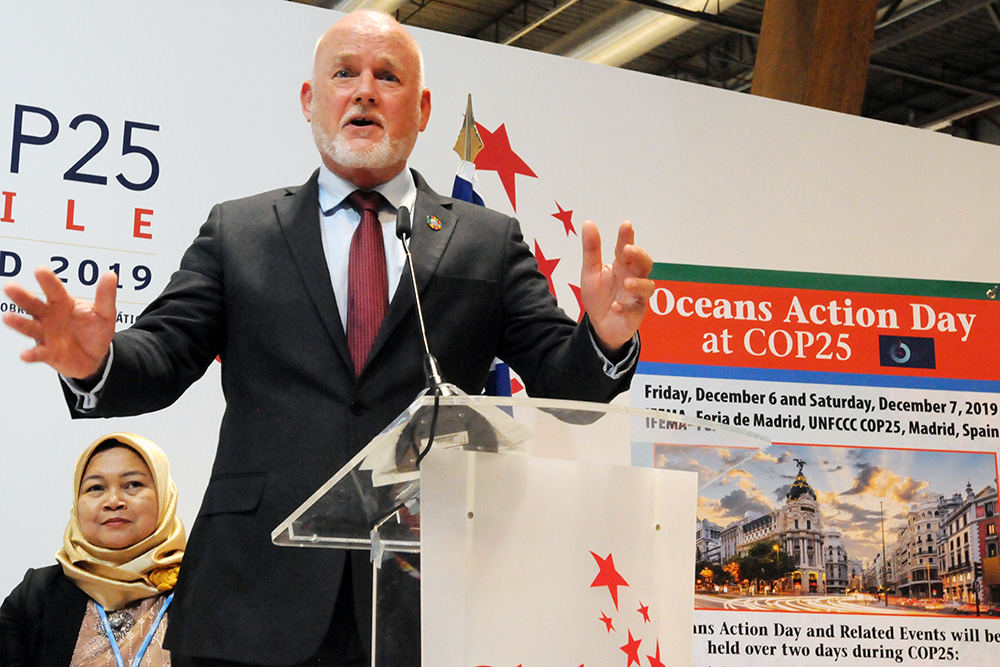
Peter Thomson, UN Secretary General’s Special Envoy for the Ocean
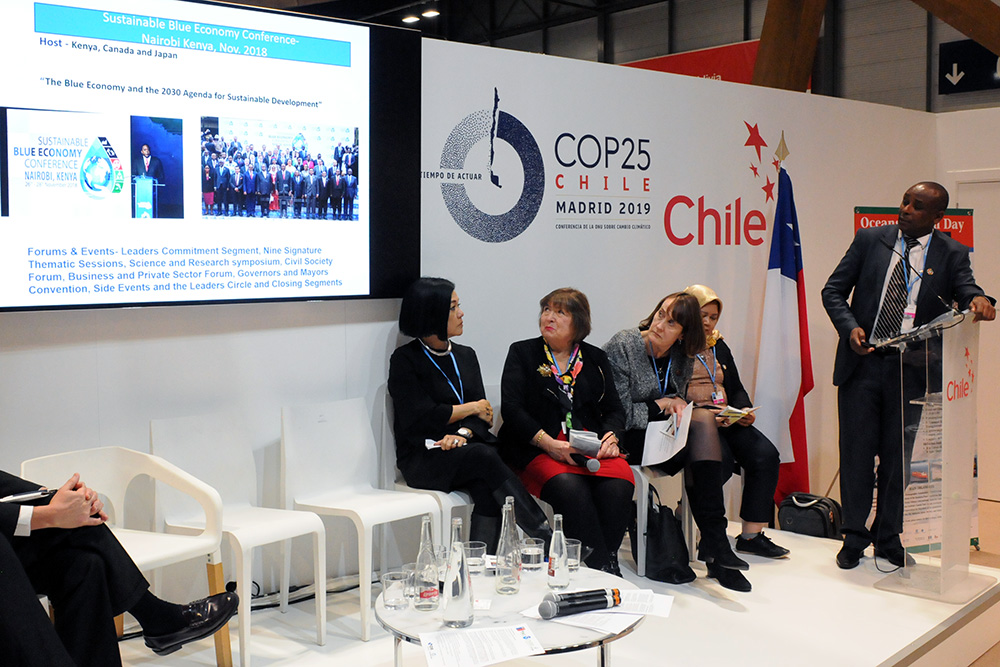
James Njiru, Director, Kenya Marine and Fisheries Research Institute
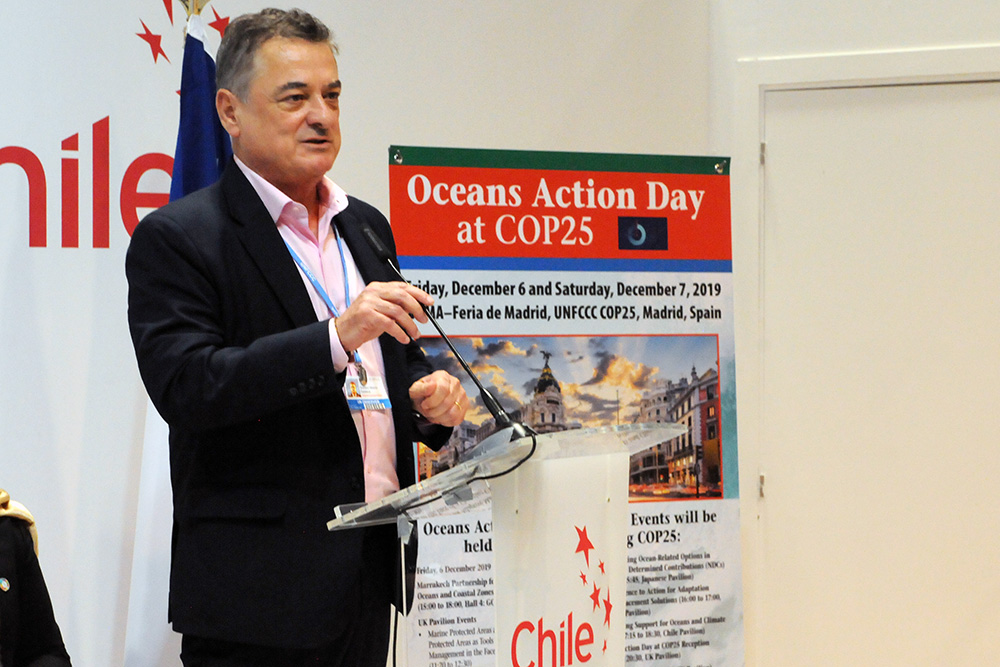
Gustavo Fonseca, Director of Programs, GEF
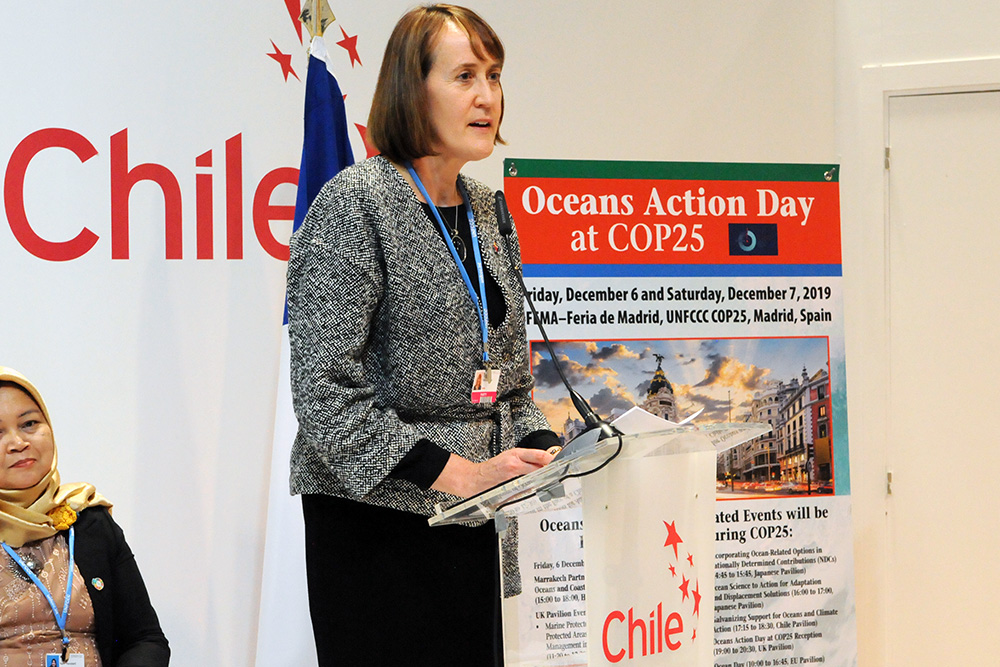
Patricia Fuller, Ambassador for Climate Change, Canada
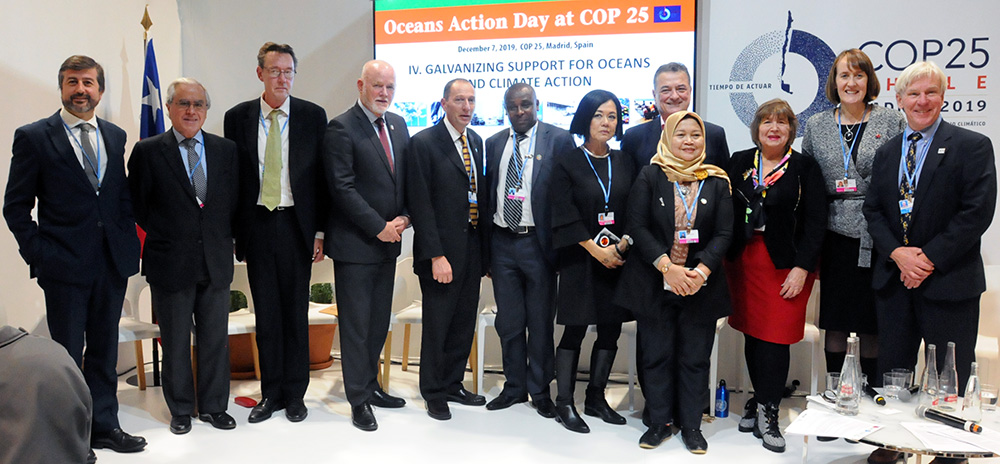
Group photo at the end of the session
Oceans Action Day Reception
Organized by: the UK Foreign and Commonwealth Office and the Department for Environment, Food, and Rural Affairs; the Global Ocean Forum; and Plymouth Marine Laboratory, UK.
Hugh Elliott, UK Ambassador to Spain and Andorra, noted that Oceans Action Day is key to spurring discussions on how best to tackle climate challenges, and to adapt and protect oceans.
Andrés Couve Correa, Minister of Science, Technology, Knowledge and Innovation, Chile, thanked Spain for “coming to Chile’s help with such love, care and generosity in organizing COP 25 extremely well.”
Biliana Cicin-Sain, President, Global Ocean Forum, stressed that the momentum to include oceans on the agenda has reached a crescendo at COP 25, and that this “Blue COP” must deliver an ocean outcome for the UNFCCC.
Carol Turley, Plymouth Marine Laboratory, UK, highlighted more than 100 oceans events at COP 25, and called for urgent implementation of climate solutions because “every molecule of CO2 counts.”
Gemma Harper, Deputy Director for Marine Policy and Evidence, UK, highlighted a global ocean alliance to champion an increase by 30% of global oceans under MPAs by 2030 to deliver blue nature-based solutions.

L-R: Hugh Elliott, UK Ambassador to Spain and Andorra; Andrés Couve Correa, Minster of Science, Technology, Knowledge and Innovation, Chile; Biliana Cicin-Sain, President, Global Ocean Forum, and ROCA Initiative; Carol Turley, Senior Scientist, Plymouth Marine Laboratory, UK; and Gemma Harper, Deputy Director for Marine Policy and Evidence, UK
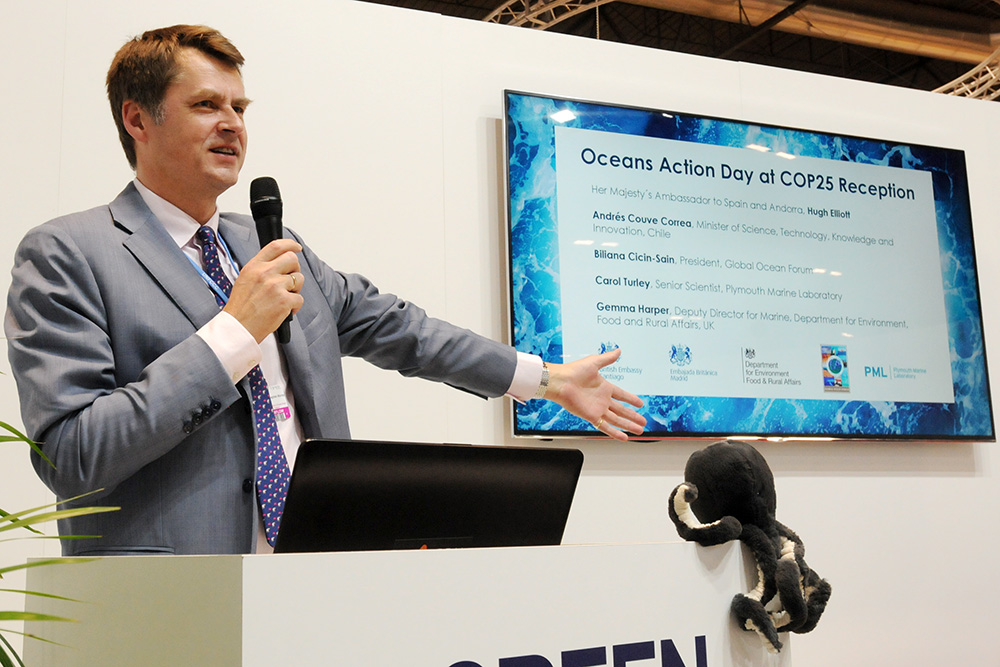
Hugh Elliott, UK Ambassador to Spain and Andorra
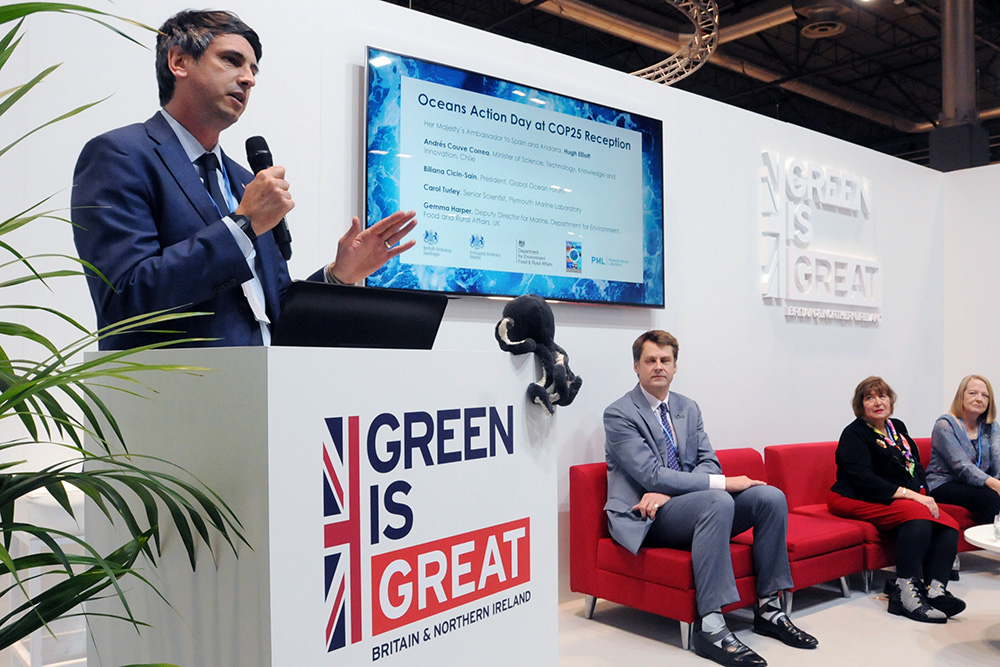
Andrés Couve Correa, Minister of Science, Technology, Knowledge and Innovation, Chile

Participants during the event
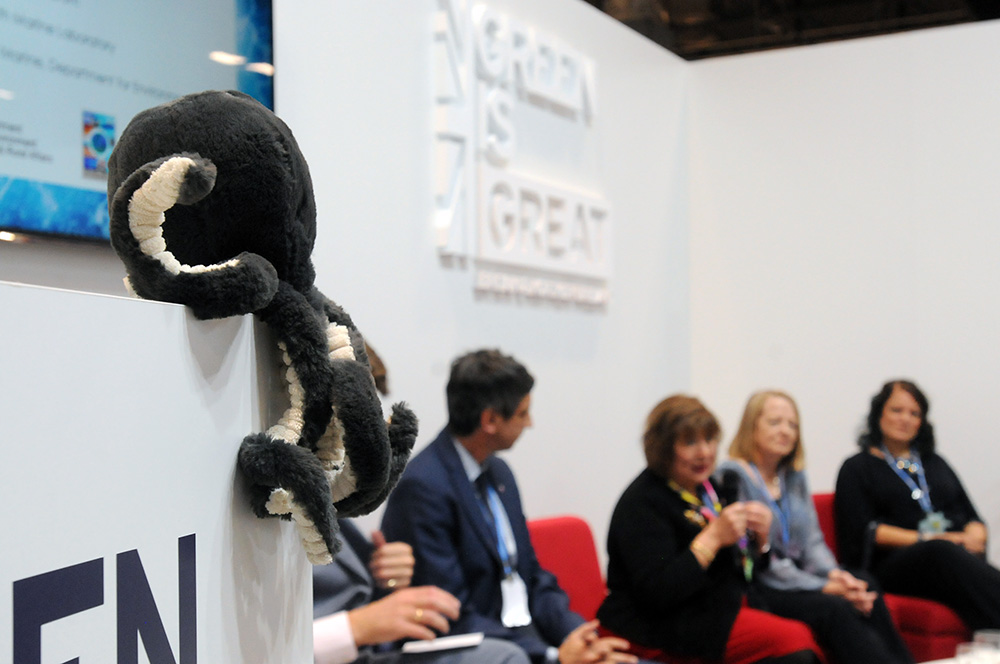
Inky the Octopus, session mascot
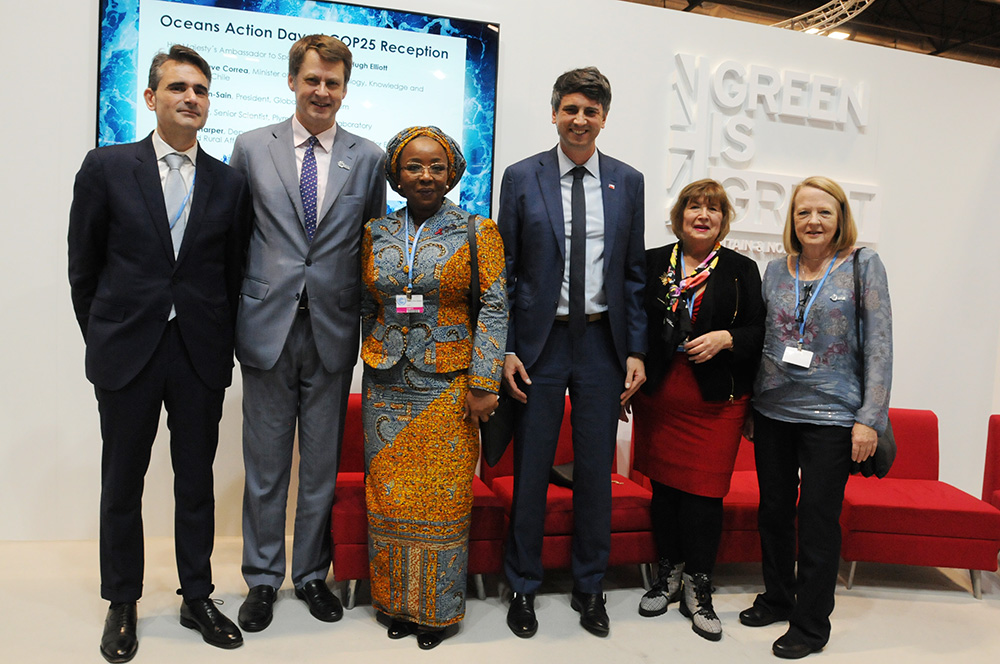
Group photo at the end of the session
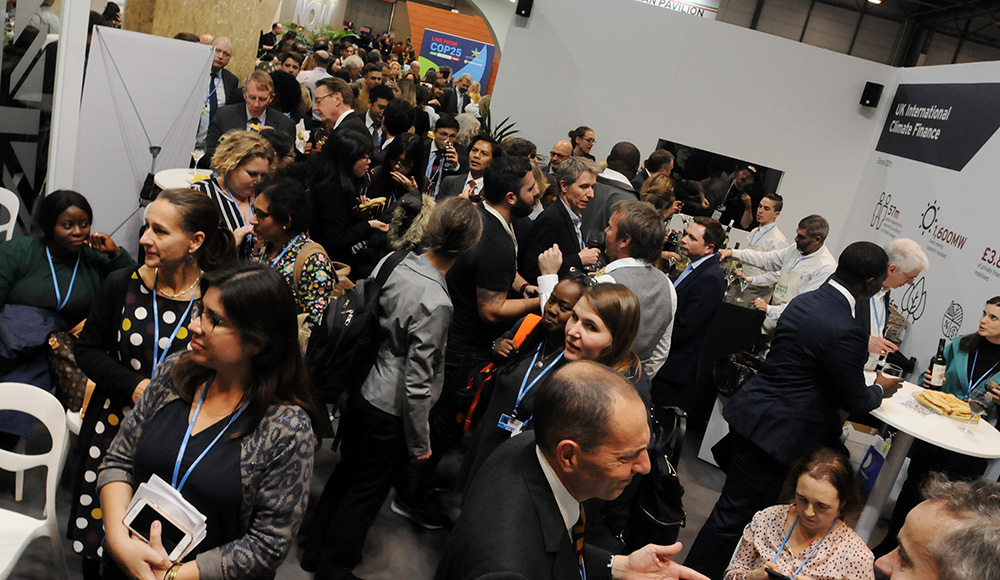
Participants enjoy beverages and food at the end of the event.
All ENB photos are free to use with attribution. For Ocean Action Day at COP 25, please use: Photo by IISD/ENB | Diego Noguera.
To receive free coverage of global environmental events delivered to your inbox, subscribe to the ENB Update newsletter.